DOWNLOAD NEWS 2014/3
by Albert Q Lam and Brian Wilson
See the Download News archive here.
With apologies for the delay between 2014/2 - here - and 2014/3, occasioned because the transition between editors has
taken longer than expected, this is a DL News of two halves, with each
of us contributing our two pennyworth/two cents’ worth. We’ve divided
our contributions, leaving half of this edition in US spelling and half
in UK spelling.
The Index is a joint effort. BW is working on a cumulative index of
recent editions:
A Modern Jazz Symposium of Music and Poetry with Charles Mingus - Bethlehem
BACH Cantatas 189, 49 and 115 - Coin - Naïve
BACH CPE Auferstehung und Himmelfahrt - Kuijken - Hyperion
BACH CPE Cello Concertos - Meneses - Pan Classics
BACH CPE Concertos for various instruments - Il Gardellino - Accent
BACH CPE Keyboard Concertos Vols 18-20 - Spanyi -BIS
BACH Easter Oratorio, Cantata 106 - Gardiner - SDG
BACH St John Passion - Egarr - Academy of Acient Music
BACH St Matthew Passion - Jacobs - Harmonia Mundi
BEETHOVEN Piano Trios 6, Archduke, and 7 - Faust, etc - Harmonia Mundi
BRAHMS Piano Trio No. 3 + VASKS - Trio Rafale - Acousence
CHILCOTT Circles of Motion, etc - The Sirens - Signum Classics
CHOPIN Piano Concertos 1 and 2 - Fliter - Linn
CORELLI Concerti Grossi, Op.6 - Gli Incogniti - Naïve
CORELLI Concerti Grossi, Op.6 - Modo Antiquo -Tactus
DEBUSSY Première Rhapsodie, etc. - Collins - Chandos
DVOŘÁK String Quartet No. 12, etc. - Brodsky Quartet - Chandos
DVOŘÁK String Quartet No. 12, etc. - Cypress String Quartet - Avie
GESUALDO Responsories for Holy Saturday - Herreweghe - Harmonia Mundi
GRIEG Symphonic Works, Vol. 3 - Aadland - Audite
HAYDN Seven Last Words - Cuarteto Casals - Harmonia Mundi
HAYDN Symphony No. 6, etc. - Handel and Haydn Society Orchestra - Coro
HAYDN Symphony No. 83 + BERLIOZ - Barbirolli - ICA
LOCATELLI Concerti Grossi selection - Europa Galante - Opus111
LOCATELLI Concerti Grossi selection -von der Golz - Harmonia Mundi
LOCATELLI Concerti Grossi, Op.1 and Op.3 - Kraemer - Hyperion
Love and The Weather - Mann - Bethlehem
Love, Gloom, Cash, Love - Herbie Nichols Trio - Bethlehem
MAHLER - Lieder aus Des Knaben Wunderhorn + RIHM - Sloane - CPO
Mann with the Most - Mann/Sam Most Quintet - Bethlehem
Mel Tormé and the Marty Paich Dek-Tette - Bethlehem
Mel Tormé Sings Fred Astaire - Bethlehem
MOERAN Complete Solo Folksong Arrangements - Thompson - BMS
MOERAN In the Mountain Country, etc. - Falletta - Naxos (also 2014/1)
MOZART Piano Concertos 24 and 25 - Tryon - APR
MOZART Piano Sonatas 1, 2, 8, 9, 17 - Blackshaw - Wigmore Hall Live
PETTERSSON Symphony No. 9 - Lindberg - BIS
POULENC Gloria; Stabat Mater - Y-P Tortelier - Chandos
POULENC Sept Repons des Ténèbres; Stabat Mater -
Reuss - Harmonia Mundi
POULENC Stabat Mater; Les Biches - Deneve - Haenssler
PROKOFIEV Piano Concerto 2 + RACHMANINOV - Yang - DG
PURCELL D Judgment of Paris - Spiritato - Resonus Classics
PURCELL Rejoice in the Lord Alway, etc. - Herreweghe - Harmonia Mundi
RACHMANINOV Piano Concerto 3 + PROKOFIEV - Yang - DG
RAVEL La Valse, etc. - Denève - Hänssler
Rejoice, the Lord is king! - O'Donnell - Hyperion
Return of Howard McGhee - Howard McGhee Quintet - Bethlehem
RIMSKY-KORSAKOV Scheherazade + TCHAIKOVSKY - Stokowski - Guild
RODRIGO Aranjuez, Fantasia + FALLA - Milos - DG/Mercury
ROSSINI Complete Overtures: 4 -Benda - Naxos
RÓZSA Film Music - Gamba - Chandos
SARASATE Guitarra, etc - Yang - Naxos
SCHUBERT Wanderers Nachtlied - Goerne - Harmonia Mundi
SCHUMANN Violin Sonata No. 1, etc. - Tetzlaff - Ondine
The Debonair Mr. Hartman - Hartman - Bethlehem
WARLOCK Choral Works - Blossom Street - Resonus
WILLIAMS Ringtones, etc - Chen - Navona
WILLIAMSON Complete Piano Concertos - Shelley - Chandos
Albert Lam’s reviews
This is my first issue as the new editor of the Download News, and it
is both an honor and pleasure for me to continue the dedicated work
that Brian Wilson has done with the DN over the past few years. I would
like to sincerely thank Brian for his inspiration, kindness, and generosity
in guiding me during this transition period and hope to carry on the
spirit of delivering the news and reviews of the most recent releases
made available in download format.
Maurice RAVEL (1875-1935)
La Valse [12:14]
Le Tombeau de Couperin [17:48]
Alborada del Gracioso [7:48]
Rapsodie espagnole [16:00]
Boléro [15:19]
Stuttgart Radio Symphony Orchestra/Stéphane Denève – rec. October/December
2013. DDD
pdf booklet included
HÄNSSLER CLASSIC CD93.305 [69:34] – from prestoclassical.co.uk (mp3, lossless)
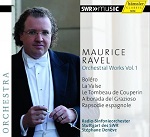 Stéphane
Denève, with his highly acclaimed recordings of Debussy (Chandos) and
Roussel (Naxos), has established himself as a masterful interpreter
of French repertoire, and he now takes on the orchestral works of Ravel
in what appears to be the first volume of a new complete cycle and his
second recording with the Stuttgart Radio Symphony Orchestra, of which
he was appointed Chief Conductor in 2011. This adds competition to Leonard
Slatkin’s continuing Ravel cycle for Naxos, which I have yet to sample,
though I’ll have to admit that I’m somewhat partial towards Denève,
having heard him conduct the Boston Symphony Orchestra in a brilliant
performance of Ravel’s Ma Mère L’Oye in 2012. Volume 1 includes
many of the heavy hitters: La Valse, Le Tombeau de Couperin, Alborada del Gracioso, Rapsodie espagnole and Boléro, in what are superb performances, excellently recorded. A high-resolution
pdf of the booklet with concise but informative notes accompanies both
mp3 and lossless downloads from Presto Classical. This is an auspicious
start to what may be a new series of modern reference recordings of
these works. I’m definitely looking forward to Volume 2.
Stéphane
Denève, with his highly acclaimed recordings of Debussy (Chandos) and
Roussel (Naxos), has established himself as a masterful interpreter
of French repertoire, and he now takes on the orchestral works of Ravel
in what appears to be the first volume of a new complete cycle and his
second recording with the Stuttgart Radio Symphony Orchestra, of which
he was appointed Chief Conductor in 2011. This adds competition to Leonard
Slatkin’s continuing Ravel cycle for Naxos, which I have yet to sample,
though I’ll have to admit that I’m somewhat partial towards Denève,
having heard him conduct the Boston Symphony Orchestra in a brilliant
performance of Ravel’s Ma Mère L’Oye in 2012. Volume 1 includes
many of the heavy hitters: La Valse, Le Tombeau de Couperin, Alborada del Gracioso, Rapsodie espagnole and Boléro, in what are superb performances, excellently recorded. A high-resolution
pdf of the booklet with concise but informative notes accompanies both
mp3 and lossless downloads from Presto Classical. This is an auspicious
start to what may be a new series of modern reference recordings of
these works. I’m definitely looking forward to Volume 2.
Edvard GRIEG (1843-1907)
In Autumn Overture, Op. 11 [11:04]
Lyric Suite, Op. 54 [16:36]
Lyric Pieces, Book 5, Op. 54 (arr. for orchestra) [5:03]
Gammelnorsk romanse med variasjoner (Old Norwegian Melody with
Variations), Op. 51 (version for orchestra) [22:33]
3 Orchestral Pieces from Sigurd Jorsalfar, Op. 56 (version for
orchestra) [16:53]
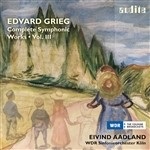 Cologne
West German Radio Symphony Orchestra/Eivind Aadland – rec. 2011. DDD
Cologne
West German Radio Symphony Orchestra/Eivind Aadland – rec. 2011. DDD
AUDITE AX 0150 (92669) [72:09] – from theclassicalshop.net (mp3, 16-bit lossless)
Volume 3 of Eivind Aadland’s cycle of Grieg’s orchestral works is another
winner and a delight from start to finish. The credit truly goes
to Aadland and the Cologne West German Radio Symphony Orchestra for
bringing new life and vitality to this repertoire and for putting down
what may very well be the modern reference recording of these works.
As with the earlier instalments, sound engineering is excellent, with
the orchestra clearly reproduced with an expansive soundstage and wide
dynamic range. My only qualm was the lack of a pdf booklet with the
download on theclassicalshop.net, but that was a minor issue compared
to the overall performance and sound quality of this outstanding release.
The Virtuoso Clarinet, Volume 2
Achille-Claude DEBUSSY (1862-1918) Première Rhapsodie [8:35]
Charles-Marie WIDOR (1844-1937) Introduction et Rondo , Op. 72 [8:06]
Leonard BERNSTEIN (1918-1990) Sonata for Clarinet and Piano [10:42]
Darius MILHAUD (1892-1974) Duo Concertant , Op. 351 [6:42]
Gabriel PIERNÉ (1863-1937) Canzonetta, Op. 19 [3:42]
Bohuslav MARTINU (1890-1959) Sonatina, H 356 [10:52]
Robert MUCZYNSKI (1929-2010) Time Pieces, Op. 43 [15:53]
Henri RABAUD (1873-1949) Solo de Concours , Op. 10 [5:47]
Michael Collins (clarinet), Michael McHale (piano) – rec. May 2013.
DDD
pdf booklet included
CHANDOS 10804 [70:22] – from theclassicalshop.net (mp3, 16- and 24-bit lossless)
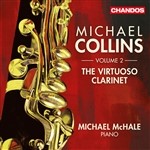
A diverse program of 20th century American and French compositions
for clarinet and piano combined with captivating performances by clarinetist
Collins and pianist McHale make this a thoroughly enjoyable album. Essentially
all of the works except for the Debussy were new to my ears, and I felt
that they were well selected to highlight the full range of colors and
dynamics of the clarinet. I would strongly urge you to sample Muczynski’s Time Pieces, Op. 43 if you are not already familiar with it.
Composed in 1983, this four-movement piece is highly accessible and
infectious with its articulated, syncopated rhythms and
has rightly become a staple of the clarinet repertoire.
For those of you interested in exploring this series further, Volume
1 is also available in mp3, 16- and 24-bit lossless on both theclassicalshop.net
and eclassical.com, though you save a few dollars on the lossless if
you get it from eclassical.com.
Johannes BRAHMS (1833-1897) Piano Trio No. 3 in C Minor, Op.
101 [21:03]
Péteris VASKS (1946) Episodi e Canto perpetuo [28:01]
Trio Rafale – rec. December 2012. DDD
pdf booklet included
ACOUSENCE CLASSICS ACO-CD 11613 [49:04] – from theclassicalshop.net (mp3, 16- and 24-bit lossless)
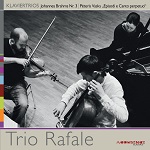 Picked
this one up out of pure curiosity. This was my first exposure to the
Trio Rafale – whose artists include Maki Wiederkehr (piano), Daniel
Meller (violin), and Flurin Cuonz (cello), all formerly students of
the Zurich University of the Arts – and my first exploration of the
Acousence label, but my curiosity was rewarded. Little did I know that
this young Swiss trio was already quite accomplished, having won a number
of international awards, including First Prize at the 2011 Melbourne
International Chamber Music Competition. The Brahms and the Vasks offer
pretty stark musical contrast, but both trios are played here with fervor
and impeccable ensemble. Although I thoroughly enjoyed the Brahms, Vasks’ Episodi e Canto perpetuo was for me the discovery and highlight
of the program. According to Vasks’ own notes, the work “describes a
difficult journey through the realms of distress, disappointment and
suffering of love”. Indeed, the Trio Rafale treats us to an intense,
deeply moving musical experience, and I strongly urge you to check out
this work. The performances are captured in stunning, lifelike sound,
and I was pleasantly surprised to find inside the pdf booklet a diagram
not only of the positions of the musicians but also of microphone placement.
My recommendation: get the lossless or better yet the 24/96 download
– it’s entirely worth it for this commendably transparent and dynamic
recording.
Picked
this one up out of pure curiosity. This was my first exposure to the
Trio Rafale – whose artists include Maki Wiederkehr (piano), Daniel
Meller (violin), and Flurin Cuonz (cello), all formerly students of
the Zurich University of the Arts – and my first exploration of the
Acousence label, but my curiosity was rewarded. Little did I know that
this young Swiss trio was already quite accomplished, having won a number
of international awards, including First Prize at the 2011 Melbourne
International Chamber Music Competition. The Brahms and the Vasks offer
pretty stark musical contrast, but both trios are played here with fervor
and impeccable ensemble. Although I thoroughly enjoyed the Brahms, Vasks’ Episodi e Canto perpetuo was for me the discovery and highlight
of the program. According to Vasks’ own notes, the work “describes a
difficult journey through the realms of distress, disappointment and
suffering of love”. Indeed, the Trio Rafale treats us to an intense,
deeply moving musical experience, and I strongly urge you to check out
this work. The performances are captured in stunning, lifelike sound,
and I was pleasantly surprised to find inside the pdf booklet a diagram
not only of the positions of the musicians but also of microphone placement.
My recommendation: get the lossless or better yet the 24/96 download
– it’s entirely worth it for this commendably transparent and dynamic
recording.
Franz Joseph HAYDN (1732-1809)
Symphony No. 83 in G Minor Hob.I:83 “The Hen” [24:19]
Hector BERLIOZ (1803-1869) Symphonie Fantastique Op. 14
[55:47]
South West German Radio Symphony Orchestra/Sir John Barbirolli – rec.
February 1969. ADD
pdf booklet included
ICA CLASSICS ICAC 5105 [80:17] – from theclassicalshop.net (mp3, 16-bit lossless)
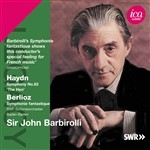
This previously unreleased 1969 studio recording from the SWR vaults
captures Sir John Barbirolli during a month of guest conducting in Germany
in the final years of his life. Barbirolli takes a more leisurely approach
to both the Haydn and the Berlioz. In the former, he manages to avoid
sounding overly ponderous until he reaches the Finale, which,
unfortunately, drags and lacks the levity and momentum of, say, Bernstein
with the NYPO (Sony 88697480452) or Szymon Goldberg with the
Netherlands Chamber Orchestra (Retrospective 93407).
The Berlioz fares better, and there are many pleasing elements to the
performance. The recording is remarkably clear and natural sounding
for its age, testimony to both the fine German engineering of the time
as well as the splendid re-mastering job.
Nikolai RIMSKY-KORSAKOV (1844-1908) Scheherazade , Op.
35 [42:44]
Pyotr TCHAIKOVSKY (1840-1893) Fantasy Overture “Romeo and Juliet”
[19:41]
Philadelphia Orchestra/Leopold Stokowski – rec. February 1962. ADD
pdf booklet included
GUILD GHCD 2403 [62:44] – from theclassicalshop.net (mp3, 16-bit lossless)
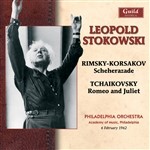
Interestingly, this is a live performance recorded at the Academy of
Music on a return visit that Stokowki made to Philadelphia in 1962. Scheherazade and the Romeo and Juliet were both Stokowski
favorites, both in the concert hall and in the recording studio, and
it seems only fitting for them to have been paired for the same performance.
Under the direction of their former conductor, the Philadelphians give
spirited performances of both works, captured in respectable transfers.
The recording could have benefited from more openness to the sound (just
compare it to Fritz Reiner’s contemporaneous and legendary RCA/Sony
studio recording 88697700362), but I suspect this has more to
do with the original recording technique than the re-mastering. As you
might expect of a live performance, audience noise is intermittently
audible but never becomes a distraction.
Franz Joseph HAYDN (1732-1809)
Symphony No. 6 in D Major, Hob.I/6 “Le Matin” [22:45]
Violin Concerto in G Major, Hob.VIIa/4 [18:37]
Symphony No. 82 in C Major, Hob.I/82 “L’ours” [27:50]
Aisslinn Nosky (violin)
Handel and Haydn Society Orchestra/Harry Christophers – rec. February
2013. DDD
pdf booklet included
CORO RECORDS COR16113 [69:12] – from theclassicalshop.net (mp3, 16-bit lossless)
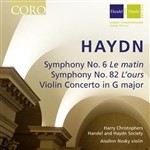 While
I abashedly admit that I have yet to attend a live concert of the Handel
and Haydn Society here in my hometown, I was compelled to download this
latest release from the Boston-based period instrument orchestra, which,
I might add, happens to be the oldest continuously performing arts organization
in the U.S. The program juxtaposes two of Haydn’s “name” symphonies: “Le Matin”, written in 1761, and one of the better-known Paris
symphonies, “L’ours”, completed in 1786, and one can clearly
see how much Haydn had progressed in terms of mastering the symphonic
art form. Tempos in the Paris symphony are comparable to other period
interpretations by Brüggen (Philips 462111) and Harnoncourt (Deutsche
Harmonia Mundi 60602), though I find Harnoncourt’s performance
with the Concentus Musicus Wien just a wee more characterful. Don’t
let that discourage you in the least: these are fine, enjoyable performances.
While
I abashedly admit that I have yet to attend a live concert of the Handel
and Haydn Society here in my hometown, I was compelled to download this
latest release from the Boston-based period instrument orchestra, which,
I might add, happens to be the oldest continuously performing arts organization
in the U.S. The program juxtaposes two of Haydn’s “name” symphonies: “Le Matin”, written in 1761, and one of the better-known Paris
symphonies, “L’ours”, completed in 1786, and one can clearly
see how much Haydn had progressed in terms of mastering the symphonic
art form. Tempos in the Paris symphony are comparable to other period
interpretations by Brüggen (Philips 462111) and Harnoncourt (Deutsche
Harmonia Mundi 60602), though I find Harnoncourt’s performance
with the Concentus Musicus Wien just a wee more characterful. Don’t
let that discourage you in the least: these are fine, enjoyable performances.
Separating the two symphonies is the Violin Concerto in G Major, featuring concertmaster Aisslinn Nosky as soloist. Blending
quite seamlessly into the rest of the ensemble, she plays with such
a fresh approach, and I found myself particularly drawn to her sensitive,
delicately nuanced phrasing. Given the relative paucity of recordings
of the Haydn violin concertos, this is a welcome addition to the discography,
and fortunately, according to the booklet notes, Nosky will be recording
all of the concertos. Textures are what I would expect from a period
orchestra, lean and clear, and the ensemble is tight. Recorded live
at Boston Symphony Hall, the sound quality is remarkably crisp with
excellent instrument separation and just the right amount of hall resonance.
(See also DL
News 2013/14.)
Robert SCHUMANN (1810-1856)
Violin Sonata No. 1 in A Minor, Op. 105 [17:06]
Violin Sonata No. 2 in D Minor, Op. 121 [32:49]
Violin Sonata No. 3 in A Minor, WoO 2 [19:48]
Christian Tetzlaff (violin), Lars Vogt (piano) – rec. June 2011 and
April 2012. DDD
pdf booklet included
ONDINE ODE 1205 [70:13] – from theclassicalshop.net (mp3, 16- and 24-bit lossless)
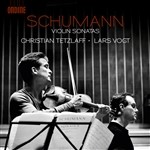 Following
their critically acclaimed release of Mozart violin sonatas, Christian
Tetzlaff and Lars Vogt pair up again, this time for a recital of Schumann’s
three violin sonatas. There’s been no shortage of recordings of these
works in recent years, with notable releases by Jennifer Koh and Reiko
Uchida for Cedille (CDR90000095) Ilya Gringolts and Peter Laul
for Onyx (ONYX4053), Anthony Marwood (his second) and Aleksandar
Madžar for Wigmore Hall Live (WHLIVE0059), Daniel Sepec and Andreas
Staier for Harmonia Mundi (HMC902048), Carolin Widmann and Dénes
Várjon for ECM ( 4766744), João Paulo Santos and Bruno Monteiro
for Centaur (CRC3086), and Ilya Kaler and Boris Slutsky for Naxos
(8.550870). I have personally favored the performances of Ulf
Wallin and Roland Pöntinen on BIS (BIS-SACD-1784, available as
mp3, 16- and 24-bit lossless on eclassical.com) and the classic recording
of Christian Ferras with Pierre Barbizet (Brilliant Classics 93791),
but this new Ondine recording is certainly a worthy alternative. The
seasoned duo delivers passionate, well-paced readings of these works,
and the natural recorded sound very nicely captures the musicians up
close. The 16-bit lossless download is perfectly suitable in terms of
sound quality, though the 24-bit studio master may be a tempting option
for the audiophile with the storage space.
Following
their critically acclaimed release of Mozart violin sonatas, Christian
Tetzlaff and Lars Vogt pair up again, this time for a recital of Schumann’s
three violin sonatas. There’s been no shortage of recordings of these
works in recent years, with notable releases by Jennifer Koh and Reiko
Uchida for Cedille (CDR90000095) Ilya Gringolts and Peter Laul
for Onyx (ONYX4053), Anthony Marwood (his second) and Aleksandar
Madžar for Wigmore Hall Live (WHLIVE0059), Daniel Sepec and Andreas
Staier for Harmonia Mundi (HMC902048), Carolin Widmann and Dénes
Várjon for ECM ( 4766744), João Paulo Santos and Bruno Monteiro
for Centaur (CRC3086), and Ilya Kaler and Boris Slutsky for Naxos
(8.550870). I have personally favored the performances of Ulf
Wallin and Roland Pöntinen on BIS (BIS-SACD-1784, available as
mp3, 16- and 24-bit lossless on eclassical.com) and the classic recording
of Christian Ferras with Pierre Barbizet (Brilliant Classics 93791),
but this new Ondine recording is certainly a worthy alternative. The
seasoned duo delivers passionate, well-paced readings of these works,
and the natural recorded sound very nicely captures the musicians up
close. The 16-bit lossless download is perfectly suitable in terms of
sound quality, though the 24-bit studio master may be a tempting option
for the audiophile with the storage space.
Allan PETTERSSON (1911-1980) Symphony No. 9 (1970) [1:10:07]
Norrköping Symphony Orchestra/Christian Lindberg – rec. January 2013.
DDD
pdf booklet included
BIS RECORDS BIS-2038 [70:07] – from eclassical.com (mp3, 16- and 24-bit lossless)
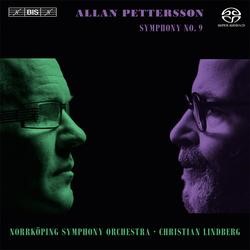 After
having received an email in which BIS Boss Robert von Bahr essentially
threw down the gauntlet and challenged all subscribers to the BIS newsletter
to an audition of this new recording of Swedish composer Allan Pettersson’s Symphony No. 9, I felt like I just had to take the plunge. Having
not previously been exposed to any of Pettersson’s other symphonies,
I was not sure what to expect. I was told that this was probably not
the symphony to start with in order to get acquainted with Pettersson’s
music, but I disregarded the warning. The ninth, composed in 1970 during
Pettersson’s nine-month hospitalization, consists of a single movement
lasting 60-70 minutes and is his longest symphony. This is one genuine
orchestral workout. The work was originally dedicated to the Gothenberg
Symphony Orchestra and its director at the time, Sergiu Comissiona,
and the booklet notes describe how their rehearsals for the debut performance
had to be conducted in 25 minute blocks separated by 5 minute breaks.
It’s a shame that their original 1978 2-LP recording for the Philips
label (6767951) has not yet been reissued in digital format.
The only other recording of the ninth symphony I could locate was on
the CPO label made by the Deutsches Symphonie-Orchester Berlin with
Alun Francis (CPO 9992312). The music is rather adventurous
— it amazes me that such a colossal, dynamic work was composed in sickness
from a hospital bed — consisting of several subsections with different
moods, though for the most part I heard a great deal of pain, anguish,
and anger. Atonal dissonances are intermixed with passages of more clearly
tonal harmony. There are even sections based on tango rhythms. Most
surprising to me was the ending, though, which quite unexpectedly resolves
with a plagal cadence on an F major triad. Was I glad to have this intense
listening experience? The answer is, surprisingly, yes. This is challenging
but highly involving music, enthusiastically performed by Lindberg and
the Norrköping Symphony Orchestra, superbly recorded. Bravo!
After
having received an email in which BIS Boss Robert von Bahr essentially
threw down the gauntlet and challenged all subscribers to the BIS newsletter
to an audition of this new recording of Swedish composer Allan Pettersson’s Symphony No. 9, I felt like I just had to take the plunge. Having
not previously been exposed to any of Pettersson’s other symphonies,
I was not sure what to expect. I was told that this was probably not
the symphony to start with in order to get acquainted with Pettersson’s
music, but I disregarded the warning. The ninth, composed in 1970 during
Pettersson’s nine-month hospitalization, consists of a single movement
lasting 60-70 minutes and is his longest symphony. This is one genuine
orchestral workout. The work was originally dedicated to the Gothenberg
Symphony Orchestra and its director at the time, Sergiu Comissiona,
and the booklet notes describe how their rehearsals for the debut performance
had to be conducted in 25 minute blocks separated by 5 minute breaks.
It’s a shame that their original 1978 2-LP recording for the Philips
label (6767951) has not yet been reissued in digital format.
The only other recording of the ninth symphony I could locate was on
the CPO label made by the Deutsches Symphonie-Orchester Berlin with
Alun Francis (CPO 9992312). The music is rather adventurous
— it amazes me that such a colossal, dynamic work was composed in sickness
from a hospital bed — consisting of several subsections with different
moods, though for the most part I heard a great deal of pain, anguish,
and anger. Atonal dissonances are intermixed with passages of more clearly
tonal harmony. There are even sections based on tango rhythms. Most
surprising to me was the ending, though, which quite unexpectedly resolves
with a plagal cadence on an F major triad. Was I glad to have this intense
listening experience? The answer is, surprisingly, yes. This is challenging
but highly involving music, enthusiastically performed by Lindberg and
the Norrköping Symphony Orchestra, superbly recorded. Bravo!
Pablo SARASATE (1844-1908) Works for Violin and Piano - Volume 4:
Transcriptions
Moritz MOSZKOWSKI (1854-1925) Guitarra , Op. 45, No.
2 [3:37]
Fryderyk CHOPIN (1810-1849)
Waltz No. 4 in F major [2:51]
Waltz No. 3 in A minor [5:16]
Waltz No. 8 in A flat major [3:20]
Nocturne No. 2 in E flat major [4:50]
Nocturne No. 8 in D major [6:09]
Souvenirs de Faust (on themes from Gounod’s opera) [11:07]
Jean-Pierre GUIGNON (1702-1775) Allegro from Sonata No.
1 [3:24]
Jean-Joseph de MONDONVILLE (1711-1772) La Chasse from
Sonata No. 5 [2:21]
Jean-Marie LECLAIR (1697-1764)
From Violin Sonata Op. 9, No. 3
III. Sarabande [2:07]
IV. Tambourin [4:03]
George Frederic HANDEL (1685-1759) Largo from Xerxes [5:38]
Jean-Baptiste SENAILLÉ (1687-1730) Allegro from Sonata
No. 9 [2:29]
Johann Sebastian BACH (1685-1750) Air from Suite in D major,
BWV 1086 (1904) [4:22]
Joachim RAFF (1822-1882) La fée d’amour (1856) [17:49]
Tianwa Yang (violin), Markus Hadulla (piano) - rec. December 2010 and
November 2012. DDD
pdf booklet included
NAXOS 8.572709 [79:46] – from eclassical.com (mp3, 16- and 24-bit lossless) or classicsonline.com (mp3) or stream
from Naxos Music Library
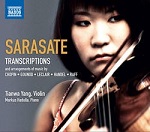 On
a lighter but certainly no less sophisticated note, this latest installment
in violinist Tianwa Yang’s ongoing series of the violin works of Pablo
de Sarasate is another winner - review.
For this album, Yang turns to Sarasate’s transcriptions for violin and
piano. While many a violinist have cherry-picked one or two works from
this repertoire for their recordings and recitals, to my knowledge no
other violinist has made the decision to record these works in completion,
and I commend Yang for her efforts to do so. While Sarasate’s transcriptions
may not have quite the same virtuosic fire as his original Spanish-flavored
compositions, they are no less ingenious, and Yang performs them beautifully
with sensitive accompaniment from Markus Hadulla. Particularly notable
for me were the lyrical transcriptions of Chopin’s Nocturne No. 8
in D-flat Major and Handel’s Largo from Act I of Serse,
HWV 40. The booklet notes, penned by the American violinist
and Sarasate specialist Joseph Gold, provide unique historical and artistic
insight into the diversity of compositions on this album.
On
a lighter but certainly no less sophisticated note, this latest installment
in violinist Tianwa Yang’s ongoing series of the violin works of Pablo
de Sarasate is another winner - review.
For this album, Yang turns to Sarasate’s transcriptions for violin and
piano. While many a violinist have cherry-picked one or two works from
this repertoire for their recordings and recitals, to my knowledge no
other violinist has made the decision to record these works in completion,
and I commend Yang for her efforts to do so. While Sarasate’s transcriptions
may not have quite the same virtuosic fire as his original Spanish-flavored
compositions, they are no less ingenious, and Yang performs them beautifully
with sensitive accompaniment from Markus Hadulla. Particularly notable
for me were the lyrical transcriptions of Chopin’s Nocturne No. 8
in D-flat Major and Handel’s Largo from Act I of Serse,
HWV 40. The booklet notes, penned by the American violinist
and Sarasate specialist Joseph Gold, provide unique historical and artistic
insight into the diversity of compositions on this album.
Wolfgang Amadeus MOZART (1756-1791)
Piano Sonata No. 1 in C Major, K. 279 [15:27]
Piano Sonata No. 2 in F Major, K. 280 [14:12]
Piano Sonata No. 8 in D Major, K. 311 [17:40]
Piano Sonata No. 17 in B flat Major, K. 570 [20:53]
Piano Sonata No. 9 in A Minor, K. 310 [22:58]
Christian Blackshaw (piano) – rec. January 2012. DDD
pdf booklet included
WIGMORE HALL LIVE WH 0061 [93:02] – from theclassicalshop.net (mp3, 16-bit lossless)
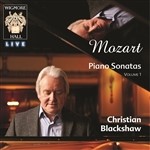 I
have to admit that I was not familiar with the name Christian Blackshaw
before downloading this album. After doing some research, I discovered
that Blackshaw, who was on the verge of international stardom in 1990,
all but disappeared from the center stage after the death of his wife
in order to raise his three daughters. After nearly two decades, he
made his comeback in 2009 with a series of well-regarded Mozart recitals
at St. George’s Bristol and an opportunity to perform at the Berlin
Philharmonic in 2011. Shortly thereafter came engagements at the International
Piano Series and at Wigmore Hall, where he performed and recorded this
entire cycle of Mozart piano sonatas between 2012 and 2013. Blackshaw’s
approach to Mozart is elegant, refined, at times introspective, and
at the heart of things, deeply musical. With his clean and delicate
execution, melodies sing, and his sensitive phrasing is coupled with
a tight control of dynamics. The recording is warm and lifelike, and
though there is hardly any noticeable audience noise while Blackshaw
is playing, one can’t help but agree with the enthusiastic applause
after the completion of each sonata. This is one of the most enjoyable
Mozart piano recitals that I have heard in a long time.
I
have to admit that I was not familiar with the name Christian Blackshaw
before downloading this album. After doing some research, I discovered
that Blackshaw, who was on the verge of international stardom in 1990,
all but disappeared from the center stage after the death of his wife
in order to raise his three daughters. After nearly two decades, he
made his comeback in 2009 with a series of well-regarded Mozart recitals
at St. George’s Bristol and an opportunity to perform at the Berlin
Philharmonic in 2011. Shortly thereafter came engagements at the International
Piano Series and at Wigmore Hall, where he performed and recorded this
entire cycle of Mozart piano sonatas between 2012 and 2013. Blackshaw’s
approach to Mozart is elegant, refined, at times introspective, and
at the heart of things, deeply musical. With his clean and delicate
execution, melodies sing, and his sensitive phrasing is coupled with
a tight control of dynamics. The recording is warm and lifelike, and
though there is hardly any noticeable audience noise while Blackshaw
is playing, one can’t help but agree with the enthusiastic applause
after the completion of each sonata. This is one of the most enjoyable
Mozart piano recitals that I have heard in a long time.
Carl Philipp Emanuel BACH (1714-1788)
Cello Concerto in A Minor, Wq. 170, H. 432
Cello Concerto in B-flat Major, Wq. 171, H. 436
Cello Concerto in A Major, Wq. 172, H. 439
Antonio Meneses (cello), Munich Chamber Orchestra – rec. July 1997.
DDD
pdf booklet included
PAN CLASSICS PN 0294 [65:51] – from eclassical.com (mp3, 16-bit lossless)
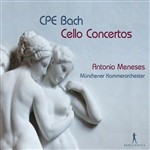
I was surprised to see that this recording was actually made in 1997,
and upon further investigation, it turns out that it is in fact a reissue
on the same label. Pan Classics originally released this album on CD
in 1998, but it has been unavailable for some time (when I last checked
Amazon.com the original 1987 CD was selling for $40 new, $260 used),
so for $11.85 this lossless download (or mp3) may be a welcome return
to the catalog for collectors. Antonio Meneses and the Munich Chamber
Orchestra give radiant and energetic performances here and are also
well recorded.
In terms of recordings of all three concertos, they do face some competition
from Raphael Wallfisch and the Scottish Ensemble (Nimbus NI5828),
Hidemi Suzuki and the Bach Collegium Japan (BIS BIS-CD-807),
and Tim Hugh and the Bournemouth Sinfonietta (Naxos 8.553298),
but the field is otherwise quite slim. Worth exploring if the music
is right.
For the Young Artist
Michael Glenn WILLIAMS (b1957)
Ring Tones [22:30]
Tone Poems, Vol. 2 [12:29]
For the Young Artist, Vol. 1 [17:14]
For the Young Artist, Vol. 2 [22:20]
Sean Chen (piano) – rec. January 2013. DDD
pdf booklet included
NAVONA RECORDS NV5942 [74:33] – from eclassical.com (mp3, 16-bit lossless)
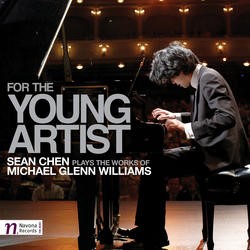 You
know that classical music has truly met the digital age when you encounter
compositions with titles such as Ring Tone No. 13. While I am
being somewhat facetious here, this is actually no joke. The first set
of 14 works on this latest release from Sean Chen, the Crystal Award
winner at the 2013 Van Cliburn International Piano Competition, is in
fact entitled Ring Tones. While it is apparent that composer
Michael Glenn Williams was at least partly influenced by modern day
cell phone ringtones (you actually spot a commonly heard one now and
then, cleverly integrated), there is much, much more to these compositions
than is given away by their titles. These are virtuosic, impressionistic
works instilled with interesting melodies and colorful washes of harmony
that require not just masterful technique but also plenty of imagination
to pull off, and Chen clearly succeeds in communicating the composer’s
vision. The Tone Poems and For the Young Artist Vol. 1 and 2 may not quite as technically demanding as the Ringtones but require no less creativity from the artist to effectively blend
elements of classical, jazz, ragtime, and film music together to effectively
convey the individual character of each of these programmatic pieces.
You
know that classical music has truly met the digital age when you encounter
compositions with titles such as Ring Tone No. 13. While I am
being somewhat facetious here, this is actually no joke. The first set
of 14 works on this latest release from Sean Chen, the Crystal Award
winner at the 2013 Van Cliburn International Piano Competition, is in
fact entitled Ring Tones. While it is apparent that composer
Michael Glenn Williams was at least partly influenced by modern day
cell phone ringtones (you actually spot a commonly heard one now and
then, cleverly integrated), there is much, much more to these compositions
than is given away by their titles. These are virtuosic, impressionistic
works instilled with interesting melodies and colorful washes of harmony
that require not just masterful technique but also plenty of imagination
to pull off, and Chen clearly succeeds in communicating the composer’s
vision. The Tone Poems and For the Young Artist Vol. 1 and 2 may not quite as technically demanding as the Ringtones but require no less creativity from the artist to effectively blend
elements of classical, jazz, ragtime, and film music together to effectively
convey the individual character of each of these programmatic pieces.
Ludwig van BEETHOVEN (1770-1827)
Cello Sonata in F Major, Op. 5, No. 1 [24:01]
Cello Sonata in G Minor, Op. 5, No. 2 [28:47]
Cello Sonata in A Major, Op. 69 [26:57]
Cello Sonata in C Major, Op. 102, No. 1 [15:47]
Cello Sonata in D Major, Op. 102, No. 2 [19:29]
Variations in G Major on “See the conqu’ring hero comes” from Handel’s Judas Maccabaeus, WoO45 [11:24]
Variations in F Major on “Ein Mädchen oder Weibchen” from Mozart’s Die
Zauberflöte, Op. 66 [9:17]
Variations in E flat Major on “Bei Männern, welche Liebe fühlen” from
Mozart’s Die Zauberflöte, WoO46 [8:54]
Horn Sonata in F Major, Op. 17 [14:14]
Steven Isserlis (cello), Robert Levin (fortepiano) – rec. December 2012.
DDD
pdf booklet included
HYPERION CDA67981/2 [158:50] – from hyperion-records.co.uk (mp3, 16- and 24-bit lossless)
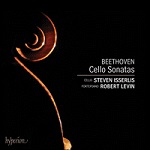 These
performances are best characterized by one phrase – joie de vivre. I have heard plenty of enjoyable recordings of the Beethoven cello
sonatas over the years (including well-revered performances of Fournier
and Gulda (DG E4776266), Rostropovich and Richter (Decca 4425652),
and more recently Bailey and Dinnerstein (Telarc CD80740)), but
none have quite captured my attention on first listening as much as
this one did. In the hands of Isserlis and Levin, these works take on
new life: outer movements dance with high-octane energy, and slow movements
are performed affectionately with unmannered lyricism. Isserlis plays
his 1726 Stradivarius with a beautiful, full-bodied tone, and Levin’s
fortepiano (a Paul McNulty copy of an 1805 Walter & Sohn instrument)
proves to be a perfect match. Together, the two succeed at maintaining
a high level of musical intensity from start to finish. As usual, Isserlis
provides his own set of insightful program notes. I took a chance here
and opted for the 24-bit studio master, which presented the artists
with remarkable transparency and exceptionally clear, detailed sound.
These
performances are best characterized by one phrase – joie de vivre. I have heard plenty of enjoyable recordings of the Beethoven cello
sonatas over the years (including well-revered performances of Fournier
and Gulda (DG E4776266), Rostropovich and Richter (Decca 4425652),
and more recently Bailey and Dinnerstein (Telarc CD80740)), but
none have quite captured my attention on first listening as much as
this one did. In the hands of Isserlis and Levin, these works take on
new life: outer movements dance with high-octane energy, and slow movements
are performed affectionately with unmannered lyricism. Isserlis plays
his 1726 Stradivarius with a beautiful, full-bodied tone, and Levin’s
fortepiano (a Paul McNulty copy of an 1805 Walter & Sohn instrument)
proves to be a perfect match. Together, the two succeed at maintaining
a high level of musical intensity from start to finish. As usual, Isserlis
provides his own set of insightful program notes. I took a chance here
and opted for the 24-bit studio master, which presented the artists
with remarkable transparency and exceptionally clear, detailed sound.
Rejoice, the Lord is king!
Ralph Vaughan WILLIAMS (1872-1958)
Old Hundredth – All people that on earth do dwell [4:49]
Sir John GOSS (1800-1880) & Alan GRAY (1855-1935)
Praise, my soul – Praise, my soul, the king of heaven! [2:35]
Jessie Seymour IRVINE (1836-1887), arr. David GRANT (1833-1893) & Dr. William Baird ROSS (1871-1950)
Crimond – The Lord’s my shepherd [3:06]
William Penfro ROWLANDS (1860-1937) & James O’DONNELL (b1961)
Blaenwern – Love divine, all loves excelling [3:21]
John HUGHES (1873-1932) & James O’DONNELL (b1961)
Cwm Rhondda – Guide me, O thou great redeemer [2:37]
George Frideric HANDEL (1685-1759) & Robert QUINNEY (b1976)
Gopsal – Rejoice, the Lord is king! [2:29]
Henry PURCELL (1659-1695) & Christopher ROBINSON (b1936)
Westminster Abbey – Christ is made the sure foundation [3:27]
Orlando GIBBONS (1583-1625) & Robert QUINNEY (b1976)
Song 22 – Love of the Father [2:34]
Orlando GIBBONS (1583-1625)
Drop, drop, slow tears (Strain 1 of Song 46) [1:23]
George Frideric HANDEL (1685-1759)
Maccabaeus – Thine be the glory [2:48]
Herbert HOWELLS (1892-1983)
Michael – All my hope on God is founded [3:26]
Anonymous – traditional & Sir Charles Villiers STANFORD (1852-1924)
St. Patrick’s Breastplate – I bind unto myself today [5:21]
Sir Hubert PARRY (1848-1918) & Sir David Valentine WILLCOCKS
(b1919) & John SCOTT (b1956)
Repton – Dear Lord and Father of mankind [3:37]
Sir Hubert PARRY (1848-1918)
Laudate Dominum – O praise ye the Lord! [2:33]
Samuel Sebastian WESLEY (1810-1876)
Hereford – O thou who camest from above [2:38]
Anonymous – traditional & Sidney CAMPBELL (1909-1974)
Picardy – Let all mortal flesh keep silence [2:47]
William CROFT (1678-1727) & Robert QUINNEY (b1976) & Alan
GRAY (1855-1935)
Hanover – O worship the king [2:21]
Ralph Vaughan WILLIAMS (1872-1958) & Robert QUINNEY (b1976)
Kingsfold – I heard the voice of Jesus say [2:37]
Ralph Vaughan WILLIAMS (1872-1958)
Down Ampney – Come down, O love divine [3:13]
Anonymous – traditional & James O’DONNELL (b1961)
Lobe den Herren – Praise to the Lord, the Almighty [3:03]
William Henry MONK (1823-1889) & Sir David Valentine WILLCOCKS
(b1919)
Eventide – Abide with me [4:46]
Sir Hubert PARRY (1848-1918), arr. Sir George THALBEN-BALL
(1896-1987)
Jerusalem – And did those feet in ancient time [3:06]
Westminster Abbey Choir/James O’Donnell, Robert Quinney (organ) – rec.
January 2013. DDD
pdf booklet included
HYPERION CDA68013 [68:37] – from hyperion-records.co.uk (mp3, 16- and 24-bit lossless)
Bob CHILCOTT (b.1955)
Circles of Motion [2:48]
Like a Rainbow [4:07]
All Things Pass [3:55]
Making Waves [7:01]
The Lily and the Rose [4:02]
So Far and Bright [2:55]
Catch a Falling Star [4:24]
Swansongs 1 [2:05]
Like a Singing Bird [5:08]
Swansongs 2 [2:15]
All for Love of One [3:08]
This Day [10:42]
A Little Jazz Mass [12:48]
The Sirens/Bob Chilcott, Iain Farrington (piano), Alexander Hawkins
(piano), Michael Chilcott (bass), Derek Scurll (drums) – rec. March
2008. DDD
pdf booklet included
SIGNUM CLASSICS SIGCD142 [65:18] – from classicsonline.com (mp3) or theclassicalshop.net (mp3, 16-bit lossless)
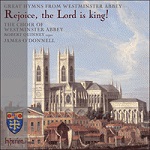
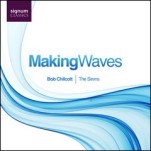 For
my foray into choral downloads for the month, I decided first on this
recent Hyperion issue from the Westminster Abbey Choir, which under
the direction of James O’Donnell presents a diverse assortment of traditional
British hymns. While I have no doubt that my British co-contributors
to this site are far more familiar with these works than I, I could
nevertheless appreciate the history and importance of these hymns, which
span the course of four centuries. The voices of the Westminster Abbey
Choir are clear, harmonious, and resonant.
For
my foray into choral downloads for the month, I decided first on this
recent Hyperion issue from the Westminster Abbey Choir, which under
the direction of James O’Donnell presents a diverse assortment of traditional
British hymns. While I have no doubt that my British co-contributors
to this site are far more familiar with these works than I, I could
nevertheless appreciate the history and importance of these hymns, which
span the course of four centuries. The voices of the Westminster Abbey
Choir are clear, harmonious, and resonant.
Providing a sharp contrast in both style and content was this album
of modern day choral works by British composer Bob Chilcott, previously reviewed on this website in 2008 but making its download debut on classicsonline.com
with a discounted price of $7.99. This album made for a perfect introduction
to Chilcott’s music, which I would describe as spiritually uplifting,
highly accessible, and imbued with catchy melodies and rich, colorful
harmonic textures. Chilcott and singer Elizabeth Fleming brought together
a group of female singers – The Sirens – specifically for this recording,
and it is clear that they were well chosen. I also have to comment on
the pianist, Iain Farrington, who in my opinion provides them with a
perfect harmonic and rhythmic accompaniment. Though no longer offered
at discount when I last checked, the mp3 album can still be purchased
for just $9.99 from classicsonline.com (£7.99 in UK).
Ernest John MOERAN (1894-1950) Complete Solo Folksong Arrangements
Six Folksongs from Norfolk [15:18]
The North Sea Ground [2:36]
High Germany [2:04]
The Sailor and Young Nancy [3:07]
The Little Milkmaid [2:09]
The Jolly Carter [2:32]
Parson and Clark [2:06]
Gaol Song [2:07]
Six Suffolk Folksongs [17:41]
Songs from County Kerry [15:48]
Adrian Thompson (tenor), Marcus Farnsworth (baritone), John Talbot (piano),
Members of the Weybridge Male Voice Choir/Christine Best – rec. May
and October 2010
pdf booklet included
BRITISH MUSIC SOCIETY BMS438CD [65:28] – from eclassical.com (mp3, 16-bit lossless)
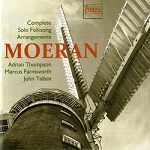
This fine release has actually been available for download from theclassicalshop.net
since 2012, but for whatever reason, it only recently became purchasable
from eclassical.com (for almost $5 less for the same 16-bit lossless
download). I have to concur with the favorable review this recording received on these pages in 2011. Although Ernest Moeran
may have collected and arranged only 70 English and Irish folksongs
compared to Vaughan Williams’ roughly 800, his arrangements nevertheless
succeeded in capturing the essence of this traditional song form.
Adrian Thompson and Marcus Farnsworth are able champions of these works
and sing beautifully, and pianist John Talbot provides a well-balanced
and sensitive accompaniment. The pdf booklet includes an excellent essay
by Roy Palmer detailing the history of the composer’s efforts to compile
folksongs. It’s well worth reading.
Ernest John MOERAN (1894-1950)
Overture for a Masque [9:27]
In the Mountain Country [6:24]
Rhapsody No. 1 in F Major [11:26]
Rhapsody No. 2 in E Major [12:17]
Rhapsody in F-sharp Major [17:32]
Benjamin Frith (piano), Ulster Orchestra/JoAnn Falletta – rec. September
2012. DDD
pdf booklet included
NAXOS 8.573106 [57:06] – from eclassical.com (mp3, 16-bit lossless)
(See also DL
News 2014/1)
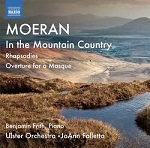 There’s
not much to add to my colleagues’ recent reviews of this album -review
#1 review
#2 – since I share their sentiments. This is gorgeous music, beautifully
performed here by the Ulster Orchestra under the direction of JoAnn
Falletta, presented in first-rate sound, and available at bargain price.
Moeran must be making yet another comeback. For the longest time, the
reference recordings of his orchestral and chamber works were the ones
offered by Lyrita. I own a number of the original LPs, which to this
day still impress me with the demonstration quality sound for which
Lyrita was well revered. Chandos has also done a highly respectable
job of expanding the Moeran discography with high quality performances
and recordings. I’ll tell you straight up that you’ll be hard pressed
to find all of the works on this current release compiled on the same
album. Since it’s downloads we are dealing with, though, you can certainly
mix and match.
There’s
not much to add to my colleagues’ recent reviews of this album -review
#1 review
#2 – since I share their sentiments. This is gorgeous music, beautifully
performed here by the Ulster Orchestra under the direction of JoAnn
Falletta, presented in first-rate sound, and available at bargain price.
Moeran must be making yet another comeback. For the longest time, the
reference recordings of his orchestral and chamber works were the ones
offered by Lyrita. I own a number of the original LPs, which to this
day still impress me with the demonstration quality sound for which
Lyrita was well revered. Chandos has also done a highly respectable
job of expanding the Moeran discography with high quality performances
and recordings. I’ll tell you straight up that you’ll be hard pressed
to find all of the works on this current release compiled on the same
album. Since it’s downloads we are dealing with, though, you can certainly
mix and match.
The same orchestra under the direction of Vernon Handley recorded Rhapsodies
Nos. 1 & 2 and In the Mountain Country on Chandos CHAN10235 and then the Rhapsody for Piano & Orchestra and Overture
for a Masque on CHAN101679. Individual tracks off these albums
can be purchased from theclassicalshop.net or prestoclassical.co.uk
(mp3 and 16-bit lossless on both sites). The Lyrita recordings of the Rhapsody for Piano & Orchestra and Rhapsody No. 2 (SRCD248) are also available for download from iTunes (mp3 only).
The American Album
Antonin DVOŘÁK (1841-1904)
String Quartet No. 12 in F, Op. 96 “American” [28:40]
Charles Tomlinson GRIFFES (1884-1920)
Two Sketches Based on Indian Themes [22:41]
Kevin PUTS (b1972)
Lento Assai [12:44]
Samuel BARBER (1910-1981)
String Quartet in B Minor, Op. 11 [17:17]
Cypress String Quartet – rec. June 2011 and September 2012. DDD
pdf booklet included
AVIE AV2304 [64:19] – from classicsonline.com (mp3) or theclassicalshop.net (mp3 or 16-bit lossless)
New World Quartets
Antonin DVOŘÁK (1841-1904)
String Quartet No. 12 in F, Op. 96 B. 179 “American” [27:40]
Aaron COPLAND (1900-1990)
Two Pieces for String Quartet [9:56]
Samuel BARBER (1910-1981)
String Quartet, Op. 11 [19:38]
George GERSHWIN (1898-1937)
Lullaby for String Quartet [9:02]
Aaron COPLAND (1900-1990), arr. Paul CASSIDY and Jacqueline
THOMAS
Rodeo – 4 Dance Episodes: IV. Hoe-Down [3:39]
Dave BRUBECK (1920-2012)
Regret (version for string quartet) [6:13]
Brodsky Quartet – rec. March 2013. DDD
pdf booklet included
CHANDOS CHAN 10801 [77:08] – from theclassicalshop.net (mp3, 16- and 24-bit lossless)
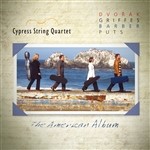
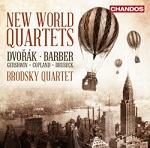 Right
after I selected the Pavel Haas Quartet as my MusicWeb Recommendation
for the “American” Quartet, along came two new releases dedicated to
American music for string quartet, both containing not only Dvořák’s
“American” but also Samuel Barber’s Op. 11. The CSQ’s tempi in general
are slightly on the brisker side, particularly in the Lento movement
of the Dvořák, in which they seem to propel forward (6:21) in comparison
to the Brodsky’s broader approach (8:27), which I tended to favor (the
Pavel Haas Quartet take the middle ground with 7:18). However, I preferred
the CSQ’s quicker tempo in the Molto adagio movement (7:18) of
Barber’s String Quartet (the famous Adagio for Strings),
which gave it more direction and momentum when compared to that
of the Brodsky (8:46). To this day, my reference for the Barber remains
the Emerson String Quartet’s 1993 recording for DG (435864).
Worry not, though, the remaining half of each of these new albums is
filled out with unique repertoire, which frame the two commonly shared
quartets in quite different lights.
Right
after I selected the Pavel Haas Quartet as my MusicWeb Recommendation
for the “American” Quartet, along came two new releases dedicated to
American music for string quartet, both containing not only Dvořák’s
“American” but also Samuel Barber’s Op. 11. The CSQ’s tempi in general
are slightly on the brisker side, particularly in the Lento movement
of the Dvořák, in which they seem to propel forward (6:21) in comparison
to the Brodsky’s broader approach (8:27), which I tended to favor (the
Pavel Haas Quartet take the middle ground with 7:18). However, I preferred
the CSQ’s quicker tempo in the Molto adagio movement (7:18) of
Barber’s String Quartet (the famous Adagio for Strings),
which gave it more direction and momentum when compared to that
of the Brodsky (8:46). To this day, my reference for the Barber remains
the Emerson String Quartet’s 1993 recording for DG (435864).
Worry not, though, the remaining half of each of these new albums is
filled out with unique repertoire, which frame the two commonly shared
quartets in quite different lights.
The number of available recordings of Griffes’ Two Sketches Based
on Indian Themes – the only work written for string quartet that
integrates elements of Native American music into a classical context
– can be counted on one hand, and the work receives an inspired performance
by the CSQ. Kevin Puts’ Lento Assai, commissioned by the CSQ
as a musical response to Mendelssohn’s Quartet in A Minor, Op. 13 and Beethoven’s String Quartet in F, Op. 135, was
debuted by the CSQ in 2009 and is here recorded for the first time.
In contrast, the Brodsky Quartet selects Copland’s Two Pieces for
String Quartet and the Hoe-Down from Rodeo (the latter
arranged by the Brodsky’s violist Paul Cassidy and cellist Jacqueline
Thomas), Gershwin’s more obscure Lullaby for String Quartet,
and Dave Brubeck’s Regret. Sound quality on both albums is truly
commendable. I purchased the CSQ in mp3 format and the Brodsky in lossless
and found both to be aurally very satisfying.
Bethlehem Jazz Reissues
Bethlehem Records, founded by Gus Wildi in 1953, has long been revered
for its jazz releases of the 1950s. Its artist roster included such
talents as Howard McGhee, Herbie Nichols, Herbie Mann, Sam Most, Oscar
Pettiford, Chris Connor, Nina Simone, Johnny Hartman, and Mel Torme,
among many others. Record collectors have also coveted Bethlehem’s progressive
cover art designed by Burt Goldblatt, who helped to establish the “cool-jazz”
style. Most of these albums have been out of print for a long time and
have recently been revived by Verve Music Group and Naxos of America
as part of a 12-month relaunch in LP, CD, and digital download format.
All of these titles can be found on classicsonline.com, iTunes, and
Amazon in mp3 format. Regrettably, no pdf booklets are included with
any of these releases, but session info can be found on the Bethlehem
Jazz Discography (www.jazzdisco.org/bethlehem-records).
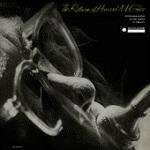 Howard
McGhee Quintet: Return of Howard McGhee (BCP42 [41:57]).
Previously only available on CD as an expensive import, this classic
mono 1955 session from the Howard McGhee Quintet makes a welcome and
more affordable return from the vaults. There’s a good blend of standards,
ballads, and McGhee originals, and no doubt fans of hard bop will have
much to enjoy here. McGhee (trumpet) and Sahib Shihab (baritone/alto
sax) exchange tasty solos, backed by the solid rhythm section of Duke
Jordan (piano), Percy Heath (bass), and Philly Joe Jones (drums).
Howard
McGhee Quintet: Return of Howard McGhee (BCP42 [41:57]).
Previously only available on CD as an expensive import, this classic
mono 1955 session from the Howard McGhee Quintet makes a welcome and
more affordable return from the vaults. There’s a good blend of standards,
ballads, and McGhee originals, and no doubt fans of hard bop will have
much to enjoy here. McGhee (trumpet) and Sahib Shihab (baritone/alto
sax) exchange tasty solos, backed by the solid rhythm section of Duke
Jordan (piano), Percy Heath (bass), and Philly Joe Jones (drums).
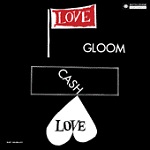 Herbie
Nichols Trio: Love, Gloom, Cash, Love (BCP81 [41:09]). Though
perhaps better known for his 1955-56 trio sessions for Blue Note Records,
pianist Herbie Nichols recorded his last session for Bethlehem in November
1957 with sidemen George Duvivier (bass) and Dannie Richmond (drums).
All but two of the tracks are Nichols originals. Nichols had a unique,
adventurous sound at the piano, and much like his contemporary Thelonious
Monk, his solos with their complex lines and harmonies could really
swing. If you like this album, I’d highly suggest exploring the Complete
Blue Note Recordings (available on iTunes and Amazon).
Herbie
Nichols Trio: Love, Gloom, Cash, Love (BCP81 [41:09]). Though
perhaps better known for his 1955-56 trio sessions for Blue Note Records,
pianist Herbie Nichols recorded his last session for Bethlehem in November
1957 with sidemen George Duvivier (bass) and Dannie Richmond (drums).
All but two of the tracks are Nichols originals. Nichols had a unique,
adventurous sound at the piano, and much like his contemporary Thelonious
Monk, his solos with their complex lines and harmonies could really
swing. If you like this album, I’d highly suggest exploring the Complete
Blue Note Recordings (available on iTunes and Amazon).
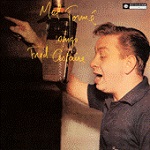
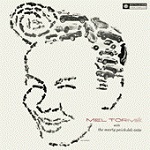 Fans
of The Velvet Fog will be pleased to see these two precious Bethlehem
sessions reissued. Both Mel Tormé and the Marty Paich Dek-Tette (BCP52 [40:46]) and Mel Tormé Sings Fred Astaire (BCP6013 [35:43]) teamed The Velvet Fog with composer/arranger Marty Paich and
a tight ensemble of West Coast jazz musicians in what are considered
to be some of Tormé’s finest sessions of the 1950s. Tormé is smooth,
energetic, and upbeat, and the arrangements are sharp and hip, making
for a synergy between vocalist and band that is simply amazing.
Fans
of The Velvet Fog will be pleased to see these two precious Bethlehem
sessions reissued. Both Mel Tormé and the Marty Paich Dek-Tette (BCP52 [40:46]) and Mel Tormé Sings Fred Astaire (BCP6013 [35:43]) teamed The Velvet Fog with composer/arranger Marty Paich and
a tight ensemble of West Coast jazz musicians in what are considered
to be some of Tormé’s finest sessions of the 1950s. Tormé is smooth,
energetic, and upbeat, and the arrangements are sharp and hip, making
for a synergy between vocalist and band that is simply amazing.
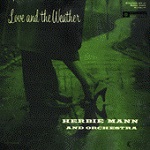
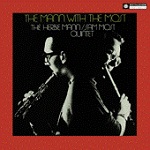 Herbie
Mann also gets two reissues this month with Love and The Weather (BCP63 [40:41]) and The Mann with the Most (BCP40 [39:34]), showcasing the jazz flutist in two quite different settings.
In the former, which dates from 1956, Mann is backed by a small rhythm
section of guitar, bass, and drums and an unidentified orchestra with
strings for a session that focuses almost entirely on mellow ballads
(the outlier is Moon Love, which has a slightly faster Latin
rhythm). The arrangements, lush as they are, don’t really give Mann
much of an opportunity to stretch out, and I have to admit that musically,
there is less interesting material here. In contrast, things liven up
considerably when Mann joins the Sam Most Quintet for a light and swinging
session from 1955 that, in spite of having been recorded in New York
City, sounds like quintessential West Coast jazz. Most of the tunes
here are mid- and up-tempo standards, and Mann and Most take turns exchanging
creative, blues-inflected solos.
Herbie
Mann also gets two reissues this month with Love and The Weather (BCP63 [40:41]) and The Mann with the Most (BCP40 [39:34]), showcasing the jazz flutist in two quite different settings.
In the former, which dates from 1956, Mann is backed by a small rhythm
section of guitar, bass, and drums and an unidentified orchestra with
strings for a session that focuses almost entirely on mellow ballads
(the outlier is Moon Love, which has a slightly faster Latin
rhythm). The arrangements, lush as they are, don’t really give Mann
much of an opportunity to stretch out, and I have to admit that musically,
there is less interesting material here. In contrast, things liven up
considerably when Mann joins the Sam Most Quintet for a light and swinging
session from 1955 that, in spite of having been recorded in New York
City, sounds like quintessential West Coast jazz. Most of the tunes
here are mid- and up-tempo standards, and Mann and Most take turns exchanging
creative, blues-inflected solos.
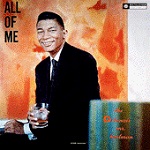 Before
he would record the album with John Coltrane that would ensure his immortality
in jazz history, Johnny Hartman released this lesser known album, The
Debonair Mr. Hartman (BCP6014 [34:34]), his second for Bethlehem.
It’s a real pity that he wasn’t noticed earlier, because his style hardly
changed in the seven years between the two recordings, and on this 1956
New York session one can clearly recognize Hartman’s characteristic
deep, warm voice and relaxed style. The majority of the tracks feature
Hartman with the Bethlehem Orchestra, though he is joined on four tracks
by horns and rhythm section including Howard McGhee, Frank Rehak, Lucky
Thompson, Hank Jones, Milt Hinton, and Osie Johnson, among others. A
welcome reissue from a highly talented and underappreciated artist.
Also available as 16-bit lossless on eclassical.com.
Before
he would record the album with John Coltrane that would ensure his immortality
in jazz history, Johnny Hartman released this lesser known album, The
Debonair Mr. Hartman (BCP6014 [34:34]), his second for Bethlehem.
It’s a real pity that he wasn’t noticed earlier, because his style hardly
changed in the seven years between the two recordings, and on this 1956
New York session one can clearly recognize Hartman’s characteristic
deep, warm voice and relaxed style. The majority of the tracks feature
Hartman with the Bethlehem Orchestra, though he is joined on four tracks
by horns and rhythm section including Howard McGhee, Frank Rehak, Lucky
Thompson, Hank Jones, Milt Hinton, and Osie Johnson, among others. A
welcome reissue from a highly talented and underappreciated artist.
Also available as 16-bit lossless on eclassical.com.
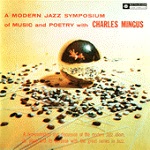
Combining narrative and music is this reissue of the more obscure but
highly entertaining 1957 Charles Mingus release A Modern Jazz
Symposium of Music and Poetry with Charles Mingus (BCP6026 [35:38]).
Actually, the title is a bit of a misnomer, since the album contains
neither a symposium nor any poetry. The opening track, Scenes in
the City, does feature actor Melvin Stewart narrating an interesting
script (co-written by the actor Lonnie Elders and Langston Hughes) about
the life of the jazzman in New York. The remainder of the album consists
of four tunes performed by Mingus, Bill Hardman or Clarence Shaw (trumpets),
Shafi Hadi (tenor or alto sax), Horace Parlan (piano), and Dannie Richmond
(drums).
Brian Wilson’s reviews
RECORDING OF THE MONTH
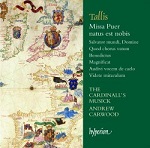 Thomas
TALLIS (c1505–1585) Missa Puer natus est nobis and other
sacred music
Thomas
TALLIS (c1505–1585) Missa Puer natus est nobis and other
sacred music
Salvator mundi, Domine [4:16]
Plainsong - Puer natus est nobis [4:22]
Missa Puer natus est nobis [24:57]
Quod chorus vatum [4:26]
Benedictus (Blessed be the Lord God of Israel) [6:01]
Magnificat a 4 [10:33]
Audivi vocem de cælo [3:44]
Videte miraculum [9:16]
The Cardinall’s Musick/Andrew Carwood
Rec. Fitzalan Chapel, Arundel Castle, UK, February 2013. DDD
Pdf booklet with texts and translations included
Hyperion CDA68026 [67:35] - from hyperion-records.co.uk (CD, mp3, 16-and 24-bit lossless)
Another recording from The Cardinall’s Musick to challenge the best
available. Please see my full review.
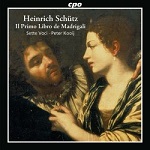 Heinrich
SCHÜTZ (1585-1672)
Heinrich
SCHÜTZ (1585-1672)
Il primo libro de madrigali, Op.1, SWV 1-19 (1611)
Sette Voci/Peter Kooij
rec. Protestant Church, Kirchheim, Germany, 10-13 January 2011. DDD
Booklet with texts and translations included with CD.
CPO 777660-2 [55:34]
This may not quite be the equal of his sacred music, but Schütz’s
Italian-style madrigals are worth having in these performances. Please
see my review of the CD for full details. Download from eclassical.com (mp3 and lossles, no booklet) or classicsonline.com.
(mp3) or stream from Naxos Music Library (abbreviated booklet, not texts).
Please, eclassical.com, let us have texts of vocal music and classicsonline.com,
give us more than the truncated version.
Carlo GESUALDO (c.1561-1613)
Sabbato Sancto – responsories for Holy Saturday [40:56]
Ave dulcissima Maria (Marian Motet) [04:30]
Peccantem me quotidie [4:25]
Tribularer si nescirem [3:01]
Tribulationem et dolorem [4:07]
Sandro GORLI (b.1948) Requiem (1989) [13:53]
Ensemble Vocal Européen/Philippe Herreweghe
rec. c.1990. DDD
HARMONIA MUNDI HMA1951320 [70:28] – from eclassical.com (mp3 and lossless) or stream from Naxos Music Library (no texts from
either).
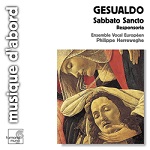 Some
of the creative figures of the renaissance were larger than life. Two
remain famous today almost as much for the fact that they were murderers
as for the quality of their creative output – the painter Caravaggio
and the composer Gesualdo. It is often supposed that Gesualdo’s madrigals
and church music, especially that composed for Holy Week, are especially
intense because of the sins which he had to expiate, but it remains
a matter of speculation if either his music or Caravaggio’s paintings
would have been any less striking had they led more conventional lives.
Some
of the creative figures of the renaissance were larger than life. Two
remain famous today almost as much for the fact that they were murderers
as for the quality of their creative output – the painter Caravaggio
and the composer Gesualdo. It is often supposed that Gesualdo’s madrigals
and church music, especially that composed for Holy Week, are especially
intense because of the sins which he had to expiate, but it remains
a matter of speculation if either his music or Caravaggio’s paintings
would have been any less striking had they led more conventional lives.
Herreweghe’s performance suits the highly dramatic music very well indeed
and the recording still sounds well. The lack of texts is a serious
handicap unless you happen to own an old pre-Vatican II Holy Week Manual
– my copy, from c.1960, still has the price 3/6 (£0.18) pencilled on
the first page. You may find it helpful to follow the score of the first
responsory, Sicut ovis ad occisionem (he was led like a lamb
to the slaughter) with text and translation, synced with this self-same
Herreweghe recording here.
The Requiem which completes the programme is a series of short
Italian-texted settings by the contemporary composer Sandro Gorli (emphatically
not Gesualdo, as stated by eclassical.com). I should have preferred
some more Gesualdo.
A rival recording on Gimell offers a shorter programme and at full price:
the Holy Saturday responsories plus four short motets, but it does come
with a booklet of texts and translations. (CDGIM015 [52:04].)
Download from gimell.com (mp3 and various lossless formats). These performances by the Tallis
Singers stress the beauty of the music as well as – perhaps slightly
at the expense of – its originality.
There’s a more recent, slightly cooler, recording of all Gesualdo’s
music for the whole of the sacred Triduum, again directed by
Philippe Herreweghe, this time with Collegium Vocale Ghent, on Phi PHI010.
I’ve only had time to dip into this via Naxos Music Library but, like
Mark Sealey, I liked it – review.
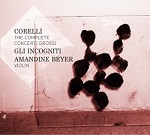
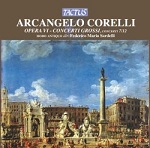 Arcangelo
CORELLI (1653-1713)
Arcangelo
CORELLI (1653-1713)
Concerti Gross, Op.6 (1714)
Gli Incogniti/Amandine Beyer (violin)
rec. live Arsenal, Metz, France, 10-11 February 2012 with patch sessions,
11-13 February 2012. DDD. Pdf booklet included.
ZIG-ZAG TERRITOIRES ZZT327 [69:29 + 75:24] - from classicsonline.com (mp3 and lossless) or stream from Naxos Music Library.
Concerti Grossi, Op.6/7-12
Modo Antiquo/Federico Maria Sardelli
rec. c.1997. Location not stated. DDD.
TACTUS TC650308 [63:28] - from eclassical.com (mp3 and lossless, no booklet) or stream from Naxos Music Library (with
pdf booklet).
Two complementary recordings of these wonderful concertos, one new (Zig-Zag)
and rivalling existing recommendations, the other (Tactus) adding tasteful
instrumentation. Please refer to my full review.
Henry PURCELL (1659-1695)
Rejoice in the Lord alway, Z49 (verse anthem) [8:10]
Remember not, Lord, our offences, Z50 (full anthem) [3:09]
Blow up the trumpet in Zion, Z10 (full anthem) [6:37]
Hear my prayer, O Lord, Z15 (full anthem) [2:27]
My heart is inditing, Z30 (Coronation anthem) [14:33]
Funeral Sentences and March: Man that is born of a woman, Z27 - Canzona
Z860 - In the midst of life, Z17 - Canzona Z860 - Thou know’st, Lord,
the secrets of our hearts, Z58b (not Z58c as stated) - March Z860 [15:01]
O Lord God of hosts, Z37 (full anthem) [4:37]
Te Deum in D, Z232 (verse anthem) [13:07]
Tessa Bonner, Patrizia Kwella (sopranos), Kai Wessel (alto), Paul Agnew,
William Kendall (tenors), Peter Kooy (bass)
Collegium Vocale Gent/Philippe Herreweghe – rec. c.1993. DDD
HARMONIA MUNDI HMC901462 [67:41] – from emusic.com (mp3)
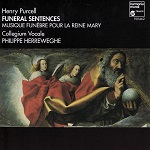 This
recording is no longer available on CD – someone is asking a whopping
£564 for it on amazon.co.uk. Even ArkivMusic list it as unavailable,
so the download is particularly welcome. It enshrines performances which
remind us that Purcell is not the sole preserve of British performers;
even though the emusic.com bit-rate barely averages an adequate 192kb/s,
it sounds well enough and it’s very inexpensive (£3.36). It’s also available
from amazon.co.uk (£7.49) and amazon.com ($8.99).
This
recording is no longer available on CD – someone is asking a whopping
£564 for it on amazon.co.uk. Even ArkivMusic list it as unavailable,
so the download is particularly welcome. It enshrines performances which
remind us that Purcell is not the sole preserve of British performers;
even though the emusic.com bit-rate barely averages an adequate 192kb/s,
it sounds well enough and it’s very inexpensive (£3.36). It’s also available
from amazon.co.uk (£7.49) and amazon.com ($8.99).
There’s a good cross-section of Purcell’s sacred music in various moods
here for those who don’t want to splash out on the wonderful Hyperion
collected edition (CDS44141/51: Bargain of the Month – review)
or as a supplement for those who have it.
The claim on the front cover of the original CD to contain Musique
funèbre pour la Reine Mary is a trifle misleading. What we actually
have are the Funeral Sentences which Purcell composed in the 1670s or
early 1680s, framed by the Canzona and March from his music for
the funeral of Queen Mary composed near the end of his own life. The
original CD also listed the setting of Thou know’st Lord as Z58c;
it’s actually the earlier setting, Z58b.
The Anglican Burial Service was the most severely missed of the services
from the Book of Common Prayer when it was banned during the Commonwealth
period of the 1650s – priests literally moonlighted to perform it –
so it’s hardly surprising that one of Purcell’s earliest works was this
setting of music from that service. This music gives the title to the
whole CD but the opening ‘Bell Anthem’ sets a very different mood. Herreweghe
and his team are equal to both and, indeed, to the rest of the programme.
There are no texts, but these are readily available online.
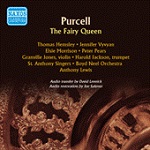 I
wish that I could be equally positive about another Purcell recording.
In 1955 Anthony Lewis’s recording of The Fairy Queen,
Z629, on three Oiseau-Lyre LPs was cutting edge but performing styles
and recording quality have moved on. I expected to find Peter Pears
the problem – almost mandatory in Britten but too thin-toned in most
other music for my liking – but in the event his singing sounds the
least dated now. Otherwise I found enough to enjoy but the overall performance
is a curate’s egg.
I
wish that I could be equally positive about another Purcell recording.
In 1955 Anthony Lewis’s recording of The Fairy Queen,
Z629, on three Oiseau-Lyre LPs was cutting edge but performing styles
and recording quality have moved on. I expected to find Peter Pears
the problem – almost mandatory in Britten but too thin-toned in most
other music for my liking – but in the event his singing sounds the
least dated now. Otherwise I found enough to enjoy but the overall performance
is a curate’s egg.
The Naxos Classical Archives transfer (9.81044/5 download only)
is very inexpensive at £2.52 from emusic.com but the low variable bit-rate at which it has been transferred – averaging
around 160kb/s – may be one of the reasons why the recording sounds
so thin, so I recommend classicsonline.com, who have it at 320kb/s for
£3.98 if you wish to purchase. Those three LPs would have cost £6, the
best part of a week’s wages in the 1950s, so you may think less than
a fiver a worthwhile sum to lay out just to try it for yourself. If
you subscribe to the invaluable Naxos Music Library, you can try it
there, though it’s not available in the USA and several other countries
– no great loss, as it happens.
It’s better to spend a little more on the Coro recording with The Sixteen
and Harry Christophers (COR16005, 2 CDs – review: download in mp3 from 7digital.com or stream from Naxos Music Library).
RECORDING OF THE MONTH
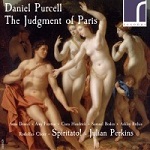 Daniel
PURCELL (c.1664-1717)
Daniel
PURCELL (c.1664-1717)
The Judgment of Paris (1701)
Venus – Goddess of Love - Anna Dennis (soprano)
Pallas - Amy Freston (soprano)
Juno – Goddess of Marriage - Ciara Hendricks (mezzo)
Paris – a shepherd - Samuel Boden (tenor)
Mercury – Messenger of the Gods - Ashley Riches (baritone)
Rodolfus Choir
Spiritato!/Julian Perkins
rec. St John’s Smith Square, London, 27-29 September 2013. DDD
pdf booklet with libretto included.
RESONUS CLASSICS RES10128 [78:42] - from resonusclassics.com (mp3, aac, 16- and 24-bit lossless) eclassical.com (mp3, 16- and 24-bit lossless)
 This
is one of Resonus’s most enjoyable discoveries among many and it’s my
own personal favourite. I’ve made it a Recording of the Month for many
reasons: as well as making available some fine music by Henry Purcell’s
younger brother or cousin which has been largely ignored, it introduces
us – me, at any rate – to some fine young performers. With very good
recording, too, and a useful booklet of notes, I can’t think of any
reason to dislike it. Find my full review along with other recent releases
from Resonus here.
This
is one of Resonus’s most enjoyable discoveries among many and it’s my
own personal favourite. I’ve made it a Recording of the Month for many
reasons: as well as making available some fine music by Henry Purcell’s
younger brother or cousin which has been largely ignored, it introduces
us – me, at any rate – to some fine young performers. With very good
recording, too, and a useful booklet of notes, I can’t think of any
reason to dislike it. Find my full review along with other recent releases
from Resonus here.
Johann Sebastian BACH (1685-1750)
By chance rather than by design there’s a good deal of Bach this month.
• Concertos for two harpsichords
Concerto in c minor, BWV1062* [14:08]
Concerto in C, BWV1061* [18:39]
Orchestral Suite No.1 in C, BWV1066 (arranged for two harpsichords by
Masato Suzuki) [24:27]
Concerto in c minor, BWV1060* [13:47]
Masato Suzuki and Masaaki Suzuki (harpsichords)
Bach Collegium Japan (Natsumi Wakamatsu, Yuko Araki (violins); Yukie
Yamaguchi (viola); Shuhei Takezawa (cello); Seiji Nishizawa (violone)*
Rec. Saitama Arts Theater, Concert Hall, Japan, January 2013. DDD/DSD
pdf booklet included
BIS-SACD-2051 [71:01] – from eclassical.com (mp3, 16- and 24-bit lossless)
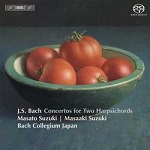 As
director of the Leipzig Collegium Musicum, Bach spent far more time
performing secular instrumental music weekly or twice-weekly, usually
in Zimmermann’s coffee house, than sacred cantatas. Some of his secular
cantatas were performed there, too, including, appropriately, the ‘Coffee’
Cantata.
As
director of the Leipzig Collegium Musicum, Bach spent far more time
performing secular instrumental music weekly or twice-weekly, usually
in Zimmermann’s coffee house, than sacred cantatas. Some of his secular
cantatas were performed there, too, including, appropriately, the ‘Coffee’
Cantata.
Three double concertos for harpsichord survive, dating from around 1736
and arrangements of earlier compositions: BWV1060 from a now lost double
concerto for oboe and violin. BWV1062 is a reworking of the well-loved
concerto for two violins, but BWV1061 was composed for two harpsichords
from the outset, though probably originally without orchestral accompaniment.
Masaaki Suzuki and his son Masato perform these works with a quintet
of performers from the Bach Collegium together with an arrangement by
Masato Suzuki of the composer’s Orchestral Suite No.1 for two unaccompanied
harpsichords. This is a strong contender though in a competitive field.
I’m not too sure, however, about the arrangement of the Suite. We know
that Bach rearranged much of his own music and Yo Tomita’s notes provide
an argument that Bach may have made a 4-hand version of this suite,
but the jury is still out for me on this one.
I enjoyed hearing it, however, and it certainly makes the recording
of more respectable length than some of the competitors which contain
only BWV1060-1062. I’m not sure of the significance of the bowl of tomatoes
on the cover, however.
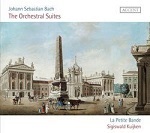 To
the many recommendable versions of the four Orchestral Suites which
already exist in their original form, I would now add the fairly recent
recording by La Petite Bande and Sigiswald Kuijken (Accent ACC24279 [79:06] – from eclassical.com,
mp3 and lossless, with pdf booklet). Stylish performances well recorded
and complete with the Accent booklet. See also Brian Reinhart’s review
of the Freiburg Baroque Orchestra in these works – DL
News 2013/18.
To
the many recommendable versions of the four Orchestral Suites which
already exist in their original form, I would now add the fairly recent
recording by La Petite Bande and Sigiswald Kuijken (Accent ACC24279 [79:06] – from eclassical.com,
mp3 and lossless, with pdf booklet). Stylish performances well recorded
and complete with the Accent booklet. See also Brian Reinhart’s review
of the Freiburg Baroque Orchestra in these works – DL
News 2013/18.
The recordings of Bach Cantatas which Christophe Coin made for Astrée
in the 1990s have the unique selling point of employing the violoncello
piccolo, as in the reissue of Nos.6, 41 and 68 which I reviewed in 2008
(Bargain of the Month: Naïve E8918 – review).
Michael Cookson thought that and two further reissues ‘fascinating and
often enthralling’ – review.
Those releases were at mid-price. Now time’s whirligig means that one
of them has been reissued again at a still lower price on the Naïve
Collection label:
• Cantata No.180, Schmücke dich, O liebe Seele,
BWV180 [23:31]
Cantata No.49, Ich geh und suche mit Verlangen, BWV49 [22:17]
Cantata No.115, Mache dich, mein Geist, bereit, BWV115 [25:05]
Andreas Scholl (alto); Barbara Schlick (soprano); Christoph Prégardien
(tenor); Gotthold Schwarz (bass)
Leipziger Concerto Vocale/Gotthold Schwarz
Ensemble Baroque de Limoges/Christophe Coin (piccolo cello)
Willem Jansen, Silbermann organ (1737)
rec. November 1993, Church of Ponitz, Thüringen, Germany. DDD
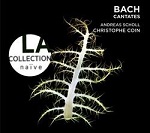 NAÏVE
LA COLLECTION NC40031 [70:41] – from eclassical.com (mp3 and lossless, no booklet) or stream from Naxos Music Library
NAÏVE
LA COLLECTION NC40031 [70:41] – from eclassical.com (mp3 and lossless, no booklet) or stream from Naxos Music Library
It’s not so much the piccolo cello that sells this recording for me
– we can’t even be sure exactly what or how large that was – so much
as the excellent solo singing, especially of Andreas Scholl and the
secure direction. The recording sounds fine, so there’s only the lack
of a booklet of texts to bemoan. The eclassical.com price of $12.72
is likely to be more attractive to those paying in US dollars than to
those who need to convert: the CD sells in the UK for around £7.50.
If you’re happy with mp3, classicsonline.com offer this in its earlier
garb (E8897) for £4.99.
• St. John Passion, BWV245 (1724 version, edited by
Richard Egarr from MS sources)
Evangelist - James Gilchrist (tenor); Jesus - Matthew Rose (bass); Pilate
- Ashley Riches (baritone); Sarah Connolly (alto); James Geer (tenor);
Philippa Hyde (soprano); Andrew Kennedy (tenor); Richard Latham (bass);
Christopher Purves (bass); Elizabeth Watts (soprano)
Academy of Ancient Music Choir
Academy of Ancient Music/Richard Egarr
rec. Saint Jude-on-the-Hill, London, UK, 1–5 April 2013.
Booklet with texts and translations included.
ACADEMY OF ANCIENT MUSIC AAM002 [31:41 + 72:56]
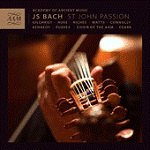 Available
on CD from 31 March, 2014 and available for download in advance from classicsonline.com (mp3 and lossless, with pdf booklet) or stream from Naxos Music Library.
Available
on CD from 31 March, 2014 and available for download in advance from classicsonline.com (mp3 and lossless, with pdf booklet) or stream from Naxos Music Library.
Film of opening section, Herr, unser Herrscher, available at aam.co.uk
Last year we were welcoming the John Butt recording of the 1739 version
of this Passion: Recording of the Month – review and DL
News 2013/4. The special virtue of this recording, among many, was
the placing of the St John in the context in which it was first
heard, Lutheran Vespers for Good Friday. Now comes a challenge from
only the second release on the Academy of Ancient Music’s own label,
offering the original 1724 version.
The 1724 original was not vastly different from the 1749 version which
is usually performed today but completists with an interest in period
performance will want both, not least for the 59-page booklet which
forms one of the glories of this recording. Dr Stephen Rose stresses
the extent to which the original St John would have burst on
the burghers of Leipzig as something utterly new. He also explains the
differences between the various revisions which Bach made and Richard
Egarr’s own notes expand our knowledge in this regard.
Rival recordings well worth considering include Jos van Veldhoven’s
recording of the 1724 version (Channel Classics CCSSA31309 – March
2012/1 DL Roundup) and Frans Brüggen on Glossa, also largely based
on 1724 (GCD921113 – May
2011/1 DL Roundup. NB: 921113 is the correct number – I omitted
one digit in 2011). The eclassical.com version of the latter is available in mp3 and lossless; it comes without
booklet but that can be downloaded from Naxos Music Library. Overall,
however, I remain faithful to John Eliot Gardiner (DG 4276482 or in an inexpensive 9-CD set, the Passions, b-minor Mass and Christmas
Oratorio, 4697692) and John Butt (Linn). I’ve yet to hear Gardiner’s
newer recording on SDG: Recording of the Month – review.
I’ve mentioned availability of the new AAM recording from Naxos Music
Library. Be aware, however, that even the latest version of the NML
player introduces short gaps between tracks; you may find the consequent
repeated stutters very off-putting. Please, Naxos, let us have a new
player without this annoying problem.
I should also mention that the lossless download, like all those in
that format from classicsonline.com, comes as one long track per CD,
so you may wish to wait a little longer for eclassical.com to offer
a more conventional lossless version. The classicsonline.com mp3 comes
with all the track divisions of the CDs.
• St Matthew Passion, BWV244 (including as appendices
alternative versions of Nos. 56 and 57)
Evangelist - Werner Güra (tenor)
Christ - Johannes Weisser (bass)
Sunhae Im, Christina Roterberg (sopranos)
Bernarda Fink, Marie-Claude Chappuis (altos)
Topi Lehtipuu, Fabio Trümpy (tenors)
Konstantin Wolff (bass-baritone)
Arttu Kataja (bass)
Ancilla I - Katharina Hohlfeld (soprano)
Ancilla II - Ulrike Bartsch (alto)
Uxor Pilati - Anja Petersen (soprano)
Pontifex - Ingolf Horenburg (bass)
Petrus - Andrew Redmond (bass)
Judas - Johannes Schendel (bass)
Witnesses - Jakob Huppmann (alto), Christian Mücke (tenor)
Aria Ach, nun ist mein Jesus - Christina Roterberg, Waltraud
Heinrich, Volker Arndt, Klaus Thiem
RIAS Kammerchor
Akademie für Alte Musik Berlin/René Jacobs
rec. Teldex Studio, Berlin, August/September 2012
pdf booklet with texts and translations included
HARMONIA MUNDI HMC902156/7 [78:53 + 80:13] – from eclassical.com (mp3, 16- and 24-bit lossless) or stream from Naxos Music Library
Also available as HMC802156/8: two SACDs plus DVD.
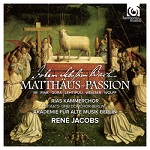 First
released in October 2013, not an auspicious time for a Bach Passion,
this set is being re-launched in good time for Good Friday 2014. That
was still a month away when I listened to this and the AAM St John (above)
but that didn’t prevent me from appreciating both recordings.
First
released in October 2013, not an auspicious time for a Bach Passion,
this set is being re-launched in good time for Good Friday 2014. That
was still a month away when I listened to this and the AAM St John (above)
but that didn’t prevent me from appreciating both recordings.
René Jacobs believes that the Matthew Passion was performed at the Thomaskirche
with Choir I and Choir II divided not left and right but fore and aft,
supported by organs in the West and East, a feature of the church until
that in the ‘swallow’s gallery’ was dismantled. Even in stereo this
works well most of the time: the opening chorus is particularly impressive.
The scheme breaks down, however, when the pairs of voices are less than
ideally matched and placed aurally in succeeding arias.
None of the singers is less than very competent and I don’t want to
make as much of the differences as some of the reviews that I have seen.
Bernarda Fink is every bit as impressive in Buß und Reu (track
6) as you might expect and more so than Christina Roterberg very soon
afterwards in Blute nur, du liebes Herz (track 8). Certainly
Roterberg sounds more distant in stereo – perhaps one needs the front-rear
perspective of the SACD here – but I was less deterred than one reviewer
by the vocal disparity. Maybe part of the problem lies in the rather
brisk tempo (3:53) which Jacobs adopts for Blute nur. Without
going the whole hog for Otto Klemperer’s 5:13, John Eliot Gardiner (DG
– 4:42) and John Butt (Linn – 4:40) seem to me to get the tempo just
right. The tenor aria Geduld, Geduld (tr. 35) suffers from the
same effect of distance and here, too, 3:03 seems to me a mite too fast
(Gardiner – 3:34, Butt – 3:29).
Nor was I as disappointed by Sunhae Im as some seem to have been; I’d
typify her tone as pure rather than thin. Overall I think this set very
competitive. A big plus is that the fastish tempi allow Harmonia Mundi
to fit the whole St Matthew on two very well-filled CDs yet also include
gamba versions of Nos. 56 and 57 as appendices.
Overall, however, I still rate John Eliot Gardiner and John Butt top
dogs here: DG 4276482 or in the 9-CD box (above) and Linn CKD313
(Recording of the Month – review –review – and DL
Roundup March 2010) respectively. Put the thumbscrews on me – as
I see that I did to myself in 2010 – and I would have to go for Butt,
but I really wouldn’t be without either and I certainly wouldn’t look
a gift horse in the mouth if I found myself with the new Harmonia Mundi
recording alone on my Desert Island.
Look out for my review of the second and final volume of The Sixteen
in Bach’s short Lutheran Masses (Coro COR16120), due to appear
on the main MusicWeb International pages soon. I couldn’t resist glancing
at some recordings of the b-minor Mass, too, in that review. My review
of the new recording of the Brandenburg Concertos from Harmonia Mundi
(HMC902176/7) will shortly be appearing on the main pages, too.
• Cantata No.106 (Actus tragicus) BWV106 [19:06]
Easter Oratorio BWV 249 [41:07]
Monteverdi Choir
English Baroque Soloists/John Eliot Gardiner
Rec. Cadogan Hall, London, 24-26 June 2013. DDD
SOLI DEO GLORIA SDG719 [60:09] – from amazon.co.uk (mp3, no booklet) or stream from Naxos Music Library (with
pdf booklet of texts and translations)
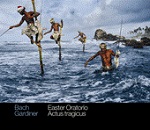 In March
2010 I recommended Helmut Rilling (4CDs, Hänssler) and Philippe
Herreweghe (Harmonia Mundi, with another Easter Cantata, BWV66) in the Easter Oratorio. Now along comes another offshoot of the Gardiner
cycle, recorded not on the pilgrimage but in London last summer, to
challenge those recommendations. If you prefer Herreweghe’s all-Easter
coupling, that remains a very safe choice. Otherwise there’s very little
between him and Gardiner other than the fact that the latter adopts
generally slightly faster tempi, though he gives Seele, deine Spezereien (track 13) plenty of time to breathe.
In March
2010 I recommended Helmut Rilling (4CDs, Hänssler) and Philippe
Herreweghe (Harmonia Mundi, with another Easter Cantata, BWV66) in the Easter Oratorio. Now along comes another offshoot of the Gardiner
cycle, recorded not on the pilgrimage but in London last summer, to
challenge those recommendations. If you prefer Herreweghe’s all-Easter
coupling, that remains a very safe choice. Otherwise there’s very little
between him and Gardiner other than the fact that the latter adopts
generally slightly faster tempi, though he gives Seele, deine Spezereien (track 13) plenty of time to breathe.
The Easter Oratorio is preceded on the new recording by the funeral
cantata, No.106, known as Actus Tragicus, not so appropriate
at first sight, but the joy of the Easter music is enhanced by following
it, as Easter itself follows the tragedy of Good Friday.
Two other recordings are well worth considering, again depending on
the appeal of the coupling: Matthew Halls who couples the Easter
Oratorio and the Ascension Oratorio (Cantata No.11) on Linn CKD373 – May
2011 DL Roundup – and Andrew Parrott on a budget twofer (with the Ascension Oratorio again, plus Magnificat and Cantatas
4 and 50: Virgin 5616472). You may have to search for the Parrott:
it doesn’t seem to be currently available, though it can be streamed
from Naxos
Music Library.
The least expensive show in town for the new SDG is offered by the Amazon
link which I’ve given (£5.99 as I write). If you must have better than
the variable bit-rate, maximum 256kb/s available there – which sounds
perfectly adequate – and you need the booklet of notes and texts it
has to be classicsonline.com.
I said in 2010 that the Easter Oratorio was actually Cantata
No.149. That’s both a typo and a partial truth: BWV249 is the correct
number, outside the numbered run of the sacred cantatas, but the work,
first conceived as secular Tafelmusik, was first performed as
a cantata in 1726.
If you’ve listened to one or both of the Bach passions in Holy Week,
you may well choose his son’s music as an alternative to the Easter
Oratorio for Easter Sunday:
Carl Philipp Emanuel BACH (1714–1788)
Die Auferstehung und Himmelfahrt Jesu , H777 (Wq240) (1777/8)
[72:33]
Uta Schwabe (soprano); Christoph Genz (tenor); Stephan Genz (baritone)
Ex Tempore, La Petite Bande/Sigiswald Kuijken
rec. Bruges, Belgium, June 2002. DDD
pdf booklet with texts and translations included
HYPERION HELIOS CDH55478 [72:33] – from hyperion-records.co.uk (mp3 and lossless)
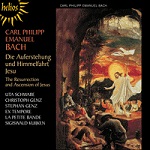 This
recording, which I recommended at full price in April
2010, is now reissued in the budget Hyperion Helios range. It would
be idle to pretend that CPE’s sacred music rivals his father’s, but
this fairly short oratorio on the Resurrection and Ascension makes an
attractive pendant to either of Bach Senior’s Passions. It’s certainly
well worth hearing and it’s unlikely that there will ever be a better
recording: the three soloists are splendid; they receive first-class
support and the lossless download is excellent. There are only two current
rivals: from Herrmann Max with Rheinische Kantorei and das kleine Konzert
in various permutations on Brilliant Classics (2 CDs or in a 30-CD set)
and Phoenix (2 CDs) and Collegium Vocale, Ghent/Philippe Herreweghe
(Warner, 13-CD CPE Bach Edition) and even the Brilliant Classics is
more expensive, running to two discs, albeit with a filler, another
Eastertide work, Gott hat den Herrn auferweckt.
This
recording, which I recommended at full price in April
2010, is now reissued in the budget Hyperion Helios range. It would
be idle to pretend that CPE’s sacred music rivals his father’s, but
this fairly short oratorio on the Resurrection and Ascension makes an
attractive pendant to either of Bach Senior’s Passions. It’s certainly
well worth hearing and it’s unlikely that there will ever be a better
recording: the three soloists are splendid; they receive first-class
support and the lossless download is excellent. There are only two current
rivals: from Herrmann Max with Rheinische Kantorei and das kleine Konzert
in various permutations on Brilliant Classics (2 CDs or in a 30-CD set)
and Phoenix (2 CDs) and Collegium Vocale, Ghent/Philippe Herreweghe
(Warner, 13-CD CPE Bach Edition) and even the Brilliant Classics is
more expensive, running to two discs, albeit with a filler, another
Eastertide work, Gott hat den Herrn auferweckt.
The Hyperion download costs just £4.99 and you should find the CD for
£5.50 or less. Someone very hopeful is asking £33.32 for the original
CDA67364 release as I write. Not only is the Helios reissue much better
value than that; it also comes with the pdf version of the fine booklet
to download, which it didn’t before.
CPE Bach’s tercentenary year has already brought forth some new and
reissued recordings of his music. We have already passed the actual
birthday (8 March) and though I’m sure that there is more to come, this
seems to be a good point to reflect on what is available.
• Keyboard Concertos:
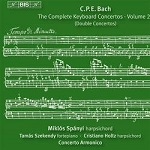 The
BIS series of concertos for keyboard(s) and orchestra has recently been
concluded with Volume 20, BIS-CD-1967, reviewed in Download
News 2014/2. I’ve enjoyed several releases in this series. The latest,
final volume, recorded in 2012 and released in 2014, includes the double
concertos Wq.47 (H479) and 46 (H408) and the Sonatina Wq.109 (H543).
Miklós Spányi plays a modern copy of a 1745 harpsichord, is accompanied
by Concerto Armonico Budapest and the album is available in mp3, 16-
and 24-bit sound from eclassical.com . The other soloists are Tamás Szekendy (fortepiano, Wq.47, establishing
a very effective contrast between the two keyboard solos) and Cristiano
Holtz (harpsichord, Wq.46 and 109) and Péter Szüts conducts the Sonatina.
As with earlier volumes there’s a helpful set of notes.
The
BIS series of concertos for keyboard(s) and orchestra has recently been
concluded with Volume 20, BIS-CD-1967, reviewed in Download
News 2014/2. I’ve enjoyed several releases in this series. The latest,
final volume, recorded in 2012 and released in 2014, includes the double
concertos Wq.47 (H479) and 46 (H408) and the Sonatina Wq.109 (H543).
Miklós Spányi plays a modern copy of a 1745 harpsichord, is accompanied
by Concerto Armonico Budapest and the album is available in mp3, 16-
and 24-bit sound from eclassical.com . The other soloists are Tamás Szekendy (fortepiano, Wq.47, establishing
a very effective contrast between the two keyboard solos) and Cristiano
Holtz (harpsichord, Wq.46 and 109) and Péter Szüts conducts the Sonatina.
As with earlier volumes there’s a helpful set of notes.
Volume 18 (BIS-CD-1787) and Volume 19 (BIS-CD-1957) were reviewed by Johan van Veen recently and you’ll find other volumes in the MusicWeb
International database by using the search engines. I liked both of
these much more than my colleague who found them unremarkable – DL
Roundup 2012/1 and DL
News 2013/7. I even made Volume 19 Recording of the Month so, for
me, only those who hate early keyboard instruments – harpsichord, fortepiano
and tangent piano – need hesitate to explore this series, which can
also be streamed from Naxos Music Library. I should add, however, that
one other reviewer – not MusicWeb International – thought Volume 19
spoiled by ‘earthbound pedantry’.
• Concertos for various instruments
Flute Concerto in D, Wq.13 (H416) [18:57]
Cello Concerto No. 1 in a minor, Wq.170 (H432) [25:16]
Oboe Concerto in B flat, Wq.164 (H466) [21:15]
Jan De Winne (flute), Emmanuel Balssa (cello), Marcel Ponseele (oboe)
Il Gardellino
Pdf booklet included
ACCENT ACC24285 [65:28] - from eclassical.com (mp3 and lossless)
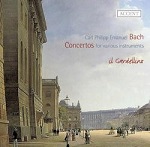
This offers a good cross-section of CPE’s concertos for various instruments,
performed by a group whom I had met once before and whom I very much
hope to encounter again. It’s every bit as good as their earlier Fasch
album – December
2011/1 DL Roundup. I presume that they take their title (= the goldfinch)
from the Vivaldi concerto of that name. It’s all well recorded, especially
in the lossless version.
As always with eclassical.com, the 16-bit lossless costs the same as
the mp3 and it’s possible to return at any time for the latter for your
personal player. The booklet is included, too.
(NB: the Cello Concerto overlaps with the Pan Classics recording reviewed
above by Albert Lam.)
Pietro Antonio LOCATELLI (1695–1764)
Concerti Grossi, Op.1: XII Concerti Grossi a 5 e 8 con 12 fughe
Elizabeth Wallfisch (violin)
The Raglan Baroque Players/Nicholas Kraemer
Rec. St Michael's Church, Highgate, London, June and September 1994.
DDD
Pdf booklet included
HYPERION DYAD CDD22066 [2 CDs for the price of one: 112:59] –
from hyperion-records.co.uk (mp3 and lossless)
L’Arte del Violino , Concerti Grossi, Op.3/1-12
Elizabeth Wallfisch (violin)
The Raglan Baroque Players/Nicholas Kraemer
Rec. St Michael's Church, Highgate, London, various dates. DDD.
Pdf booklet included
HYPERION CDS44391/3 [3 CDs for the price of two] – from hyperion-records.co.uk (mp3 and lossless)
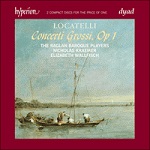
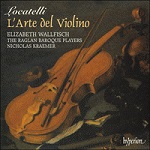 If
you enjoy Corelli’s Op.6 Concerti Grossi, the grand-daddies of the genre
(see above), you should also like Locatelli’s works in much the same
mould, influenced as they were by Geminiani, himself a pupil of Corelli.
If
you enjoy Corelli’s Op.6 Concerti Grossi, the grand-daddies of the genre
(see above), you should also like Locatelli’s works in much the same
mould, influenced as they were by Geminiani, himself a pupil of Corelli.
Hyperion don’t quite have a monopoly on recordings of his music but
they do seem to have it pretty well sewn up with very fine performances
and recordings and at attractive prices on 2-for-1 and 3-for-2 sets
– see also their recordings of the Op.4 Concertos (CDD22064 –
download from hyperion-records.co.uk,
mp3 and lossless – review)
and Op.8 Sonatas – review.
If you’re feeling less than adventurous, either of the single-CD albums
below might well be what you are looking for, but be aware that either
one costs around the same price on disc as the Hyperion twofer of Op.1.
Downloading from eclassical.com, who charge by the second evens out
that disparity somewhat but not entirely.
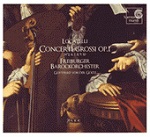
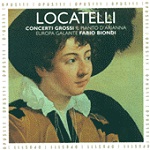 • Concerti Grossi, Op.1/11, 8 (‘Christmas’), 7, 2, 9 and 4
• Concerti Grossi, Op.1/11, 8 (‘Christmas’), 7, 2, 9 and 4
Freiburg Baroque Orchestra/Gottfried von der Golz
Released 2006.
HARMONIA MUNDI HMC901889 [60:53] – from eclassical.com (mp3 and lossless) or stream from Naxos Music Library
• Concerto Grosso, Op.1/7 in D, Sinfonia in F minor,
(Sinfonia … per l’esequie della sua donna … in Roma – attrib.
Locatelli); Concerti Grossi Op.7/6 in E-flat (il pianto d’Arianna),
Op.1/2 in c minor, Op.1/12 in g minor
Europa Galante/Fabio Biondi
Released 1996
OPUS111 OP30104 [55:52] – from eclassical.com (mp3 and lossless) or stream from Naxos Music Library
If you are looking for just one Locatelli recording, either of these
could well be it.
Joseph HAYDN (1732-1809)
Die sieben letzten Worte unseres Erlösers am Kreuze Hob.XX:02
(The Seven Last Words of Christ)
Cuarteto Casals (Abel Tomàs Realp, Vera Martínez Mehner (violins), Jonathan
Brown (viola), Arnau Tomàs Realp (cello)
Rec Teldex Studio, Berlin, November 2012. DDD
Pdf booklet included
HARMONIA MUNDI HMC902162 [60:06] – from eclassical.com (mp3, 16- and 24-bit lossless)
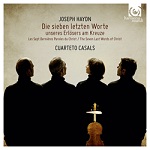 Haydn
composed the Seven Last Words as a series of adagios between
reflections on each of the Christ’s words from the cross in Cádiz Cathedral
on Good Friday. Originally for a chamber orchestra, in which form they
are sometimes performed, they were soon published in Haydn’s own arrangement
for string quartet – the most common form on record – and are also sometimes
performed as an oratorio.
Haydn
composed the Seven Last Words as a series of adagios between
reflections on each of the Christ’s words from the cross in Cádiz Cathedral
on Good Friday. Originally for a chamber orchestra, in which form they
are sometimes performed, they were soon published in Haydn’s own arrangement
for string quartet – the most common form on record – and are also sometimes
performed as an oratorio.
Two of my favourites are from the Kodály Quartet, available inexpensively
on Naxos (8.550346, with the incomplete final quartet, Op.103),
and on period instruments from the Fitzwilliam Quartet (Linn CKD153 – June
2009 DL Roundup). The latter is available in mp3 and 16-bit lossless
versions but the new Harmonia Mundi also comes in 24-bit format for
a little extra and the sound is very immediate in that medium. I also
sampled the mp3 and that sounds very good of its kind, too. If you select
the 16- or 24-bit lossless, as always with eclassical.com, you can return
later for the mp3 for your personal player.
The Linn booklet explains why slightly faster tempi than usual are appropriate
but the new recording comes in overall slightly faster still, though
with small variations in the approach to each of the movements. I thought
the tempi on both recordings worked well – as do the even faster performances
from the Kodály Quartet – but if you prefer something slower and more
reflective, the Quatuor Mosaïques (Naïve E8803) should satisfy
those seeking period instruments.
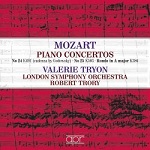 Wolfgang
Amadeus MOZART (1756-1791)
Wolfgang
Amadeus MOZART (1756-1791)
Piano Concerto No.24 in c minor, K491 (with premiere recording of cadenza
by Leopold Godowsky) [31:35]
Rondo in A, K386 [8:55]
Piano Concerto No.25 in C, K503 [32:08]
Alternative Hummel cadenza to K491 [3:34]
Valerie Tryon (piano)
London Symphony Orchestra/Robert Trory
rec. Henry Wood Hall, London, 18-19 April, 2009. DDD
Pdf booklet included
APR 5640 [76:13] - from hyperion-records.co.uk (mp3 and lossless)
Please see my review and comparison with other recordings.
RECORDING OF THE MONTH
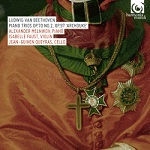 Ludwig
van BEETHOVEN (1770-1827)
Ludwig
van BEETHOVEN (1770-1827)
Piano Trio No.6 in E flat, Op.70/2 (1808) [30:03]
Piano Trio No.7 in B flat, Op.97 (Archduke) (1811) [37:26]
Isabelle Faust (violin), Jean-Guihen Queyras (cello), Alexander Melnikov
(Graff fortepiano)
rec. Teldex Studio, Berlin, September 2011. DDD.
HARMONIA MUNDI HMC902125 [67:29] – from eclassical.com (mp3 16- and 24-bit lossless)
 This
is one of the best recordings of the best-known of Beethoven’s piano
trios and it’s well recorded, as is especially apparent from the 24-bit
download. Only those averse to the sound of the fortepiano need steer
clear and even they may appreciate that the balance between instruments
is restored on this recording – violin and cello are also of period
vintage. My full review has recently appeared on the main MusicWeb International pages.
This
is one of the best recordings of the best-known of Beethoven’s piano
trios and it’s well recorded, as is especially apparent from the 24-bit
download. Only those averse to the sound of the fortepiano need steer
clear and even they may appreciate that the balance between instruments
is restored on this recording – violin and cello are also of period
vintage. My full review has recently appeared on the main MusicWeb International pages.
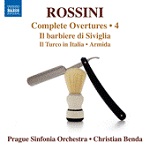 Gioachino
ROSSINI (1792–1868) Complete Overtures, Volume 4
Gioachino
ROSSINI (1792–1868) Complete Overtures, Volume 4
Il barbiere di Siviglia [7:27]
Il Turco in Italia [9:00]
Sinfonia in E flat [5:23]
Ricciardo e Zoraide [9:11]
Torvaldo e Dorliska [8:36]
Armida [6:09]
Le Comte Ory [3:06]
Bianca e Falliero [3:38]
Prague Sinfonia Orchestra/Christian Benda
rec. Kulturní Dum Barikádníku, Prague, Czech Republic, 5 and 6 September,
2011
(track 1), and Produkcní dum Vzlet, Prague, 30 and 31 May, 2012 (tracks
2-8)
Pdf booklet included
NAXOS 8.572735 [55:31] - from classicsonline.com (mp3 and lossless) or stream from Naxos Music Library.
This fourth and final volume has all the qualities of its three predecessors.
A full review by BW is pending on the main MusicWeb International pages
alongside Volumes 1 and 2 of the series, gathered together on one blu-ray
audio disc (NBD002 [1:57:46]). That BD-A disc is excellent value
for less than the price of two Naxos CDs or lossless downloads, so you
may wish to wait to see if Volumes 3 and 4 are similarly gathered together
in that format.
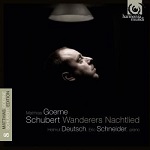 Franz
SCHUBERT (1797-1828)
Franz
SCHUBERT (1797-1828)
Wanderers Nachtlied
Matthias Goerne (baritone)
Helmut Deutsch (piano, CD 1), Eric Schneider (piano, CD 2)
rec. Teldex Studio, Berlin, February-April 2011 (CD1); June 2011-February
2012 (CD2)
Booklet with texts and translations included
HARMONIA MUNDI HMC902109/10 [68:35 + 61:50] - from eclassical.com com (mp3, 16- and 24-bit download)
Please see my review for full details.
Not the starting point for a collection of Schubert lieder but certainly
valuable for those who already have more basic collections.
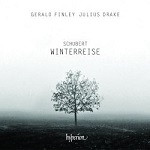 Franz
SCHUBERT (1797-1828)
Franz
SCHUBERT (1797-1828)
Winterreise, D911 [74:33]
Gerald Finley (baritone)
Julius Drake (piano)
rec. All Saints Church, East Finchley, London, 26-28 February 2013.
DDD.
pdf booklet with texts and translations included
HYPERION CDA68034 [74:33]
Please see my review for detail.
One or more of the Fischer-Dieskau versions remains essential but this
is one of the best of several recent recordings. John Quinn made it
a Recording of the Month – review.
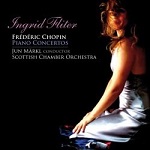 Frédéric
CHOPIN (1810-1849)
Frédéric
CHOPIN (1810-1849)
Piano Concerto No.1 in e minor, Op.11 [39:57]
Piano Concerto No.2 in f minor, Op.21 [33:22]
Ingrid Fliter (piano)
Scottish Chamber Orchestra/Jun Märkl
rec. June 2013. DDD/DSD.
LINN CKD455 [73:19] - from linnrecords.com (Hybrid SACD, mp3, 16- and 24-bit lossless, with booklet); or eclassical.com (mp3 and 16-bit lossless, no booklet)
Please see my full review of this competitive new release.
Gustav MAHLER (1860-1911) Lieder aus Des Knaben Wunderhorn (selection):
Lob des hohen Verstandes [2:46]
Wo die schönen Trompeten blasen [6:49]
Revelge [7:00]
Rheinlegendchen [3:09]
Wer hat dies Liedlein erdacht [2:01]
Urlicht [5:08]
Wolfgang RIHM (b. 1952) Lieder nach Rainer Maria Rilke: Vier
Gedichte für Singstimme und Orchester (2000, orch, 2004):
Neue Sonne [4:46]
Dies überstanden haben [4:47]
Ich ging; ich wars [4:40]
Oft auf dem Glasdach [5:40]
Gustav MAHLER Lieder eines fahrenden Gesellen:
Wenn mein Schatz Hochzeit macht [3:43]
Ging heut’ morgen übers Feld [4:03]
Ich hab’ ein glühend Messer [2:53]
Die zwei blauen Augen von meinem Schatz [4:53]
Christoph Prégardien (tenor)
Bochumer Symphoniker/Steven Sloane - rec. September 2011. DDD.
CPO 777675-2 [62:26] – from eclassical.com (mp3 and lossless, no booklet) or stream from Naxos Music Library (with
truncated booklet – no texts)
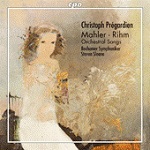 I
enjoyed this recording so much that I need only refer you to Michael
Cookson’s enthusiastic review of the CD and add that the lossless download does the performances proud.
Don’t be put off by the fact that the download version has a different
cover from the one illustrated in MC’s review. Traditionalists need
not have too many fears about the recent date of the Rihm settings of
Rilke – there’s nothing too avant-garde here.
I
enjoyed this recording so much that I need only refer you to Michael
Cookson’s enthusiastic review of the CD and add that the lossless download does the performances proud.
Don’t be put off by the fact that the download version has a different
cover from the one illustrated in MC’s review. Traditionalists need
not have too many fears about the recent date of the Rihm settings of
Rilke – there’s nothing too avant-garde here.
Only the Lieder eines fahrenden Gesellen overlap with Karita
Karnéus’s very fine selection of Mahler’s orchestral songs on BIS-SACD1600 –Recording
of the Month and DL
News January 2012/1. Of course, neither of these recent recordings
quite matches Dietrich Fischer-Dieskau in the Lieder eines fahrenden
Gesellen (DG Originals 4779375, with other lieder, or 4497352,
with Symphony No.1, both at budget price).
One grumble, however, concerns the lack of a booklet at all from eclassical.com
and the fact that even Naxos Music Library offer only a truncated booklet
– the cover, two pages and the back insert. This is a common problem
with CPO downloads; it applies to theclassicalshop.net, too, and it
won’t do, especially when unfamiliar sung texts are involved. You can
find the German texts of Neue Sonne online: http://www.deutschelyrik.de/index.php/neue-sonne.html and Dies überstanden haben at http://www.aphorismen.de/gedicht/166147
 Sergei
Vasil’yevich RACHMANINOV (1873-1943)
Sergei
Vasil’yevich RACHMANINOV (1873-1943)
Piano Concerto No. 3 in d minor Op.30 [40:46]
Sergei PROKOFIEV (1891-1953)
Piano Concerto No. 2 in g minor Op.16 [30:58]
Yuja Wang (piano)
Simón Bolívar Symphony Orchestra of Venezuela/Gustavo Dudamel
rec. live, Sala Simón Bolívar, Centro de Acción Social por la Música,
Caravas, Venezuela, February 2013. DDD.
DEUTSCHE GRAMMOPHON 4791304 [71:41] – from 7digital.com (mp3)
Please see my full review of this recording.
Peter WARLOCK (1894-1930) A short while for dreaming : Choral works by Peter Warlock
As dew in Aprylle [1:57]
The Night (arr. Fred Tomlinson) [2:00]
My Own Country (arr. Fred Tomlinson) [2:04]
Benedicamus Domino [1:22]
The Full Heart [4:52]
The Spring of the Year [1:37]
Yarmouth Fair (arr. C. Armstrong Gibbs) [2:07]
Call for the Robin-Redbreast and the Wren [2:33]
The Shrouding of the Duchess of Malfi [4:50]
The Bayley Berith the Bell Away [2:36]
Corpus Christi [4:27]
A Cornish Christmas Carol [4:45]
Lullaby [1:36]
I saw a fair maiden [4:16]
Ha’nacker Mill [2:16]
One More River [1:44]
The Lady’s Birthday [2:44]
A Cornish Carol [1:22 ]
The Rich Cavalcade [2:52]
Bethlehem Down [4:24]
Blossom Street/Hilary Campbell
rec. St James’ Church, Sussex Gardens, London, 7-10 November, 2013.
DDD
pdf booklet with texts included
RESONUS CLASSICS RES10129 [56:33] – from resonusclassics.com (mp3, aac, 16- and 24-bit lossless flac).
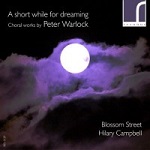 Spring
seems an odd time of year to release a recording of Peter Warlock’s
choral works when most of them relate to the Christmas season. The fact
is, however, that there are not enough recordings of his output apart
from The Curlew, so I’m happy to have the familiar here, such
as Bethlehem Down, for the sake of so much that is unfamiliar
– there are six world premiere recordings here – and for a much wider
range of repertoire than you might expect from this genre. The very
fine Chandos collection (CHAN9182, Finzi Singers) offers a much
shorter collection, about half of what is on offer here, with Moeran’s Songs of Springtime and Phyllida and Corydon taking up
almost half of the space.
Spring
seems an odd time of year to release a recording of Peter Warlock’s
choral works when most of them relate to the Christmas season. The fact
is, however, that there are not enough recordings of his output apart
from The Curlew, so I’m happy to have the familiar here, such
as Bethlehem Down, for the sake of so much that is unfamiliar
– there are six world premiere recordings here – and for a much wider
range of repertoire than you might expect from this genre. The very
fine Chandos collection (CHAN9182, Finzi Singers) offers a much
shorter collection, about half of what is on offer here, with Moeran’s Songs of Springtime and Phyllida and Corydon taking up
almost half of the space.
This being Peter Warlock, there’s nothing prim and proper – The Shrouding
of the Duchess of Malfi is really spooky – and the performances
match the music. The recording is good, too, especially in the lossless
formats, and the presentation in no way falls short of what you would
expect from a physical CD.
Please see also my survey of recent Resonus Classics recordings up to
and including RES10128 – here.
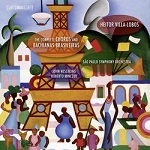 Heitor
VILLA-LOBOS (1887-1959) Complete Bachianas Brasileiras and Chôros
Heitor
VILLA-LOBOS (1887-1959) Complete Bachianas Brasileiras and Chôros
• Volume 1: Introduction to the Chôros (1929);
Two Chôros bis (1928); Chôros No.2 (1924);
No.3 (1925); No.10 (1926); No.12 (1929) [79:58] – from BIS-CD-1520
• Volume 2: Chôros No.6 (1926); No.1 (1920);
No.8 (1925); No.4 (1926); No.9 (1929) [81:18] – from BIS-CD-1450
• Volume 3: Chôros No.11 (1928); No.5, Alma
Brasileira (1925); No.7, Settimo (1924), with Cristina Ortiz
[78:06] – from BIS-CD-1440
• Volume 4: Bachianas Brasileiras No.5 (1938-45);
No.4 (1930-41); No.6 (1938) and No.1 (1930-38) with Donna Brown (soprano)
and Jean-Louis Steuerman (piano) [59:23] from BIS-CD-1410
• Volume 5: Bachianas Brasileiras No.2 (1930); No.3
(1938); No.4 (version for orchestra, 1941) with Jean-Louis Steuerman
(piano) [69:52] – from BIS-CD-1250
• Volume 6: Bachianas Brasileiras No.7 (1942); No.9
(for string orchestra, 1945); No.9 (for choir a cappella, 1945); No.8
(1944);Quinteto em forma de Chôros (1928) with members
of the Berlin Philharmonic Wind Quintet [77:48] – from BIS-CD-1400
• Volume 7: The Complete Solo Guitar Music (Anders Miolin
(guitar)) [78:28] – from BIS-CD-686
BISCD1320/2
For full details of the recent release of the BIS series of recordings
as a bundle from eclassical.com,
please see my recent review.
Francis POULENC (1899-1963)
Sept Répons des Ténèbres, FP181 [27:16]
Stabat mater, FP148 [34:46]
Carolyn Sampson (soprano)
Cappella Amsterdam, Estonian Philharmonic Chamber Choir
Estonian National Symphony Orchestra/Daniel Reuss
rec. Estonia Concert Hall, Tallinn, Estonia, June 2012. DDD
Pdf booklet with texts and translations included
HARMONIA MUNDI HMC902149 [62:02] – from eclassical.com (mp3, 16- and 24-bit losssless) or stream from Naxos Music Library
Stabat mater , FP148* [32:08]
Les Biches , FP36 [33:20]
Marlis Petersen (soprano)
Stuttgart Southwest Radio Vocal Ensemble, North German Radio Chorus
Stuttgart Radio Symphony Orchestra/Stéphane Denève
rec. live Beethovensaal, Liederhalle Stuttgart, 23 March 2012* and Funkstudio,
SWR Stuttgart, 12 – 15 March 2012. DDD.
Pdf booklet with texts and translations included
HÄNSSLER CD93.297 [65:28] – from eclassical.com (mp3 and lossless) or stream from Naxos Music Library
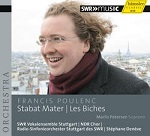
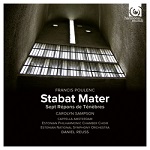 Do
you prefer Poulenc’s setting of the Good Friday hymn Stabat Mater with more music for Passiontide or with his ballet music Les Biches?
My personal problem is that I have to play the two halves of the otherwise
excellent Hänssler recording separately – for all that the complete
ballet is a more serious work than the better-known suite, it follows
too hard on the heels of Stabat Mater – and there are other fine
recordings of the ballet or suite. Otherwise I’m very grateful to have
the chance to hear a work which is less well-known than Poulenc’s Gloria,
but unmistakably the music of the same composer – sometimes dramatic
but mainly reflective and always powerful, ‘a requiem without despair’,
as he described it.
Do
you prefer Poulenc’s setting of the Good Friday hymn Stabat Mater with more music for Passiontide or with his ballet music Les Biches?
My personal problem is that I have to play the two halves of the otherwise
excellent Hänssler recording separately – for all that the complete
ballet is a more serious work than the better-known suite, it follows
too hard on the heels of Stabat Mater – and there are other fine
recordings of the ballet or suite. Otherwise I’m very grateful to have
the chance to hear a work which is less well-known than Poulenc’s Gloria,
but unmistakably the music of the same composer – sometimes dramatic
but mainly reflective and always powerful, ‘a requiem without despair’,
as he described it.
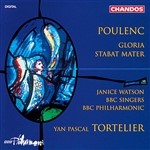
The chief competitor for these two recordings comes from Yan Pascal
Tortelier, BBC Singers and BBC Phil, on Chandos CHAN9341, recorded
in 1994 and coupled with the Gloria, well worth considering if
you don’t have a recording of that better-known work. Even if you do,
Tortelier sets an impressively high benchmark for his successors. With
good recording (mp3 and lossless) and the booklet as part of the bargain,
you could do very much worse than download this from theclassicalshop.net.
You can compare it with the two more recent versions from Naxos Music
Library.
The new Harmonia Mundi is slightly shorter and a few cents less expensive
than the Hänssler comparing mp3 and 16-bit like for like, but the newer
recording is also available in 24-bit sound for a small premium but
nevertheless less expensive than the CD. The coupling of the Holy Week Tenebræ responsories is appropriate and the performance very
good.
 Joaquín
RODRIGO (1901-1999)
Joaquín
RODRIGO (1901-1999)
Concierto de Aranjuez for guitar and orchestra (1939) [21:30]
Manuel de FALLA (1876-1946)
Homenaje pour le Tombeau de Claude Debussy (1920) [3:51]
El Sombrero de tres picos: Danza del Molinero (farruca)
[3:02]
Joaquín RODRIGO
Invocación y danza [9:13]
Fantasía para un gentilhombre for guitar and small orchestra
(1954) [22:26]
Miloš Karadaglic (guitar)
London Philharmonic Orchestra/Yannick Nézet-Séguin
rec. Abbey Road Studios, London, 8-9 January 2013 (Aranjuez and Fantasía); Nikodemuskirche, Berlin, September 2013 (rest)
DEUTSCHE GRAMMOPHON 4810652 ( International) MERCURY CLASSICS
4810811 (UK) [60:06] – from7digital.com (mp3)
Please see my full review of this recording: Fans of Miloš Karadaglic will need no urging to obtain
this, his third album. Others may do so with confidence, even if they
have other versions of one or both of the main works.
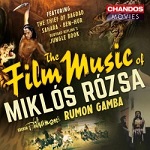 Miklós
RÓZSA (1907-1995) Film Music
Miklós
RÓZSA (1907-1995) Film Music
Suite from The Thief of Bagdad (1939-40) [19:46]
Suite from ‘Rudyard Kipling’s Jungle Book’ (1942) [31:12]
Suite from Sahara (1943) [7:46]
Suite from Ben-Hur (1959) [21:17]
BBC Philharmonic/Rumon Gamba
rec. Media City, Salford, UK, 1 and 20 July, 2013. DDD.
pdf booklet available
CHANDOS CHAN10806 [80:07] – from theclassicalshop.net (mp3, 16- and 24-bit lossless)
This recording offers a strong challenge even to Rózsa’s own recordings.
Please see my full review , with links to other Chandos recordings of Rózsa’s music.
Malcolm WILLIAMSON (1931-2003)
The Complete Piano Concertos
Piano Concerto No. 1 in A (1958) [18:09]
Concerto for two pianos and string orchestra in a minor (1971) [19:50]
Piano Concerto No. 2 in f-sharp minor (1960) [15:47]
Piano Concerto No. 3 in E-flat (1962) [30:05]
Sinfonia concertante in F-sharp (1958-62) [17:47]
Piano Concerto No. 4 in D (1993) [14:52]
Piers Lane (piano)
Howard Shelley (piano) (Concerto for Two Pianos)
Yoram Levy (trumpet), Mark Bain (trumpet), Martin Phillipson (trumpet)
(Sinfonia concertante)
Tasmanian Symphony Orchestra/Howard Shelley
rec. various dates, Federation Concert Hall, Hobart, Tasmania, Australia
Pdf booklet included
HYPERION CDA68011/2 [53:48 + 62:46] – download from hyperion-records.co.uk (mp3, 16- and 24-bit lossless)
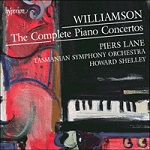 ‘[This]
should do more than any other entry in the catalogue to restore Williamson
closer to the central core. Wonderful music.’ Recording of the Month
(Rob Barnett – review).
‘[This]
should do more than any other entry in the catalogue to restore Williamson
closer to the central core. Wonderful music.’ Recording of the Month
(Rob Barnett – review).
Could any new recording rival Malcolm Williamson himself in Concerto
No.3 which three of us enjoyed in 2007 (Lyrita SRCD.280, with
Organ Concerto, etc. – review –review – review)?
That’s something special but the new recording is equally self-recommending
since none of the works apart from the Third Concerto and Sinfonia
Concertante (another fine Lyrita release,SRCD.281, RLPO/Charles
Groves – review and review)
are otherwise available.
To Rob Barnett’s enthusiastic review I need only add that this new release
completed my conversion to Williamson’s music which those Lyrita releases
had begun and that the 24-bit version of the recording is first-rate.
It costs only a little more than the CD set, itself not much more expensive
than the 16-bit and mp3, but make sure that your system can cope with
24/96 sound.
Thomas ADÈS (b. 1971)
Violin Concerto ‘Concentric Paths’, Op. 23 (2005) [19:10]
Three Studies from Couperin (2006) [14:09]
Peter Herresthal (violin); Norwegian Radio Orchestra (Kringkastingsorkestret)/Andrew
Manze
rec. April 2013, Store Studio, NRK Oslo, Norway
Pdf booklet included
BIS BIS-CD-8003 [34:13] Available only as a download from eclassical.com (mp3, 16- and 24-bit lossless).
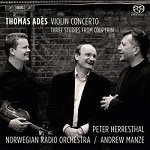 Once
upon a time we had a choice of formats and lengths on vinyl – singles,
EPs, 10” and 12” LPs – and the 10” was ideal for two short works. Now
BIS have practically reinvented the 10”, at least in terms of programme
length. EMI were first in the field – see September
2009 DL Roundup – effectively with the equivalent of an EP, containing
just the Violin Concerto. If you want that version, with Anthony Marwood,
CoE and Thomas Adès himself, ignore the defunct passionato.com link:
if you want full 320kb/s mp3, go to sainsburysentertainment.co.uk , where you will find it, now reassigned
to Warner Classics, for £2.99.
Once
upon a time we had a choice of formats and lengths on vinyl – singles,
EPs, 10” and 12” LPs – and the 10” was ideal for two short works. Now
BIS have practically reinvented the 10”, at least in terms of programme
length. EMI were first in the field – see September
2009 DL Roundup – effectively with the equivalent of an EP, containing
just the Violin Concerto. If you want that version, with Anthony Marwood,
CoE and Thomas Adès himself, ignore the defunct passionato.com link:
if you want full 320kb/s mp3, go to sainsburysentertainment.co.uk , where you will find it, now reassigned
to Warner Classics, for £2.99.
Dan Morgan, who summed up his feelings as ‘Two contemporary works of
singular style and substance; fine engineering, too’ – review – listened to the 24-bit version, so I tried the humble 16-bit and mp3
and they also sound fine. As for the performance, the music is still
too recent to have fully percolated into my conscious or unconscious,
so I can’t choose between two performances which both make the work
more amenable than I expected back in 2009.











